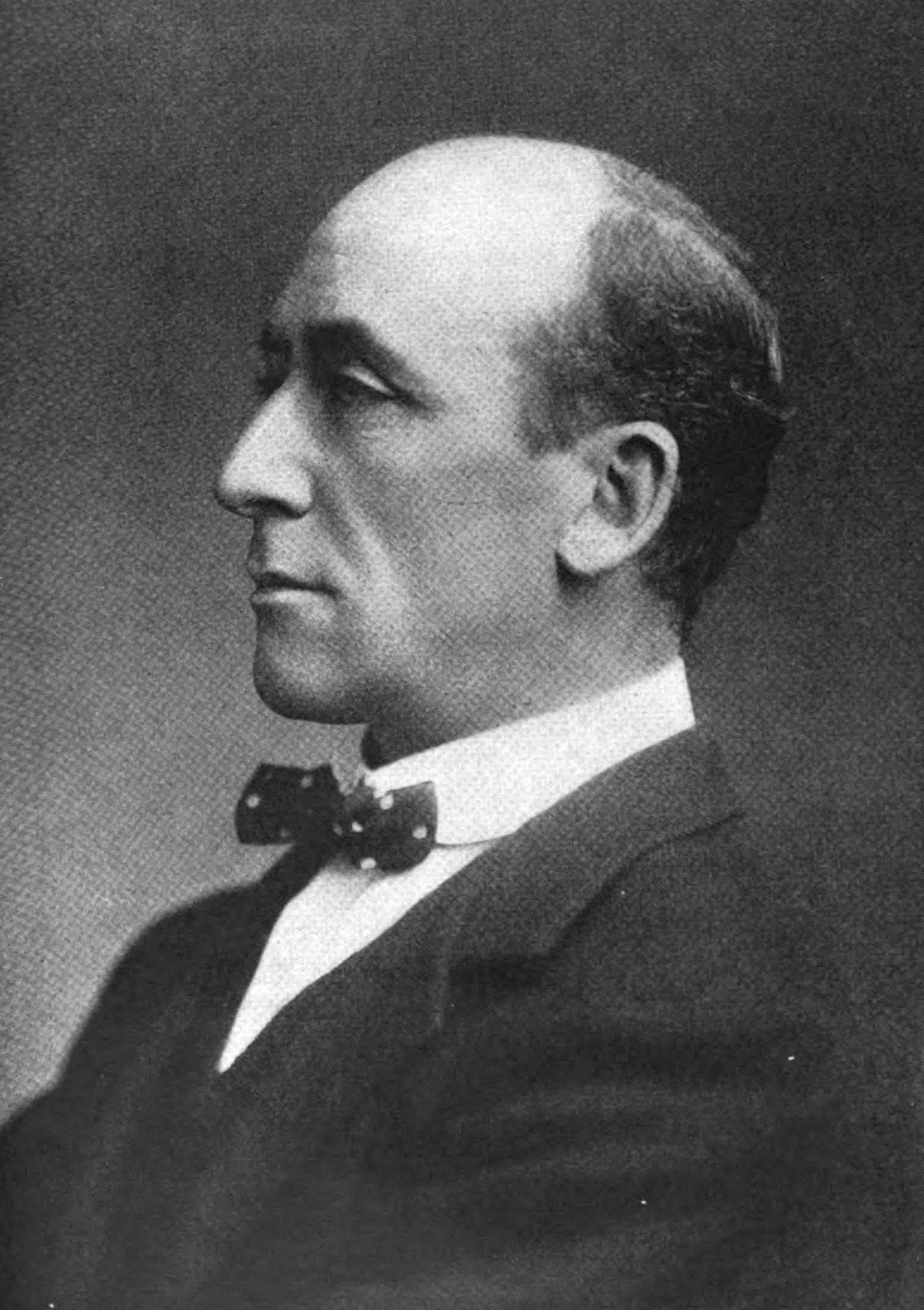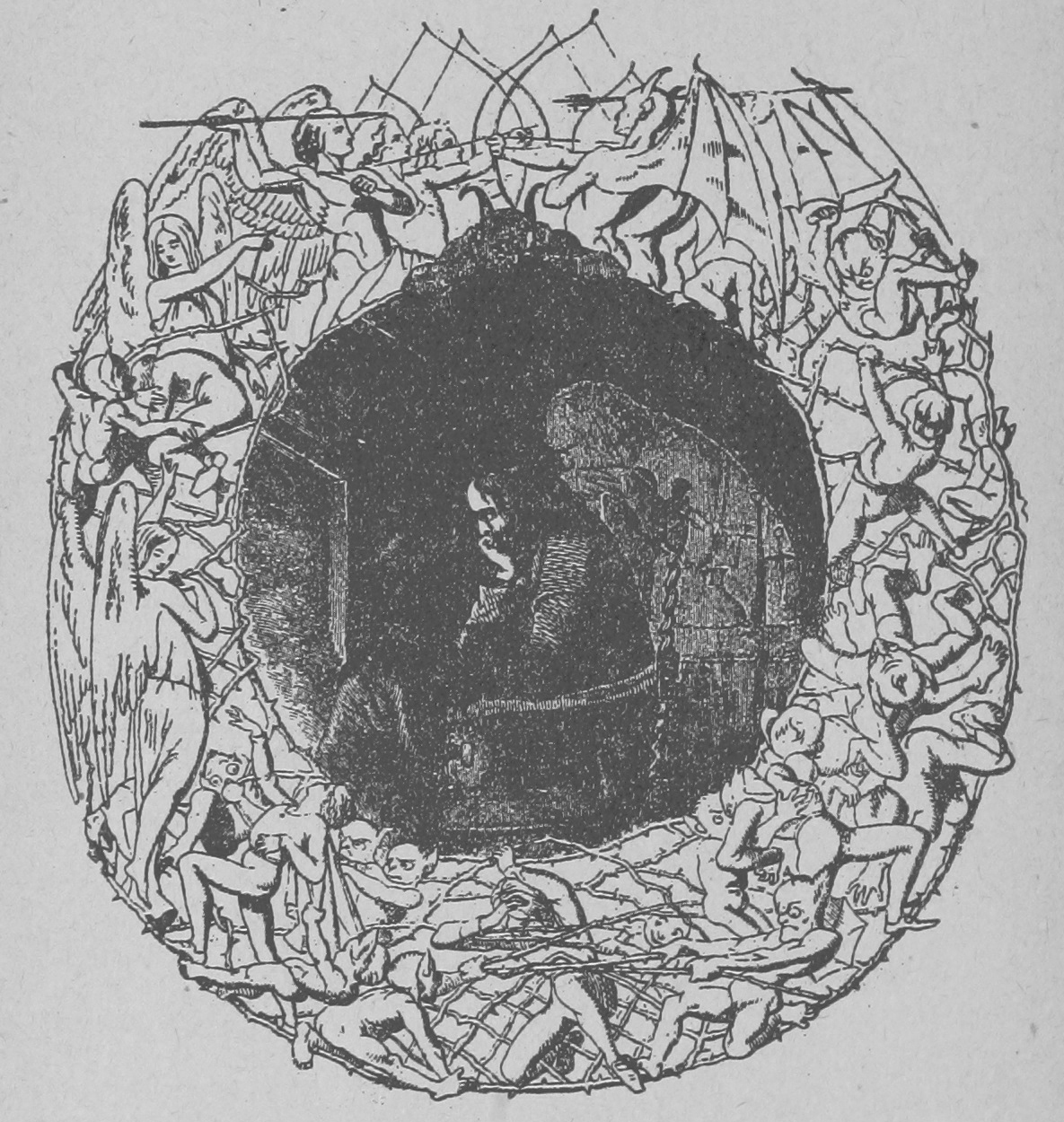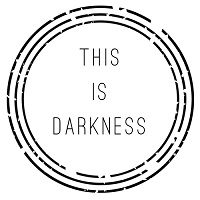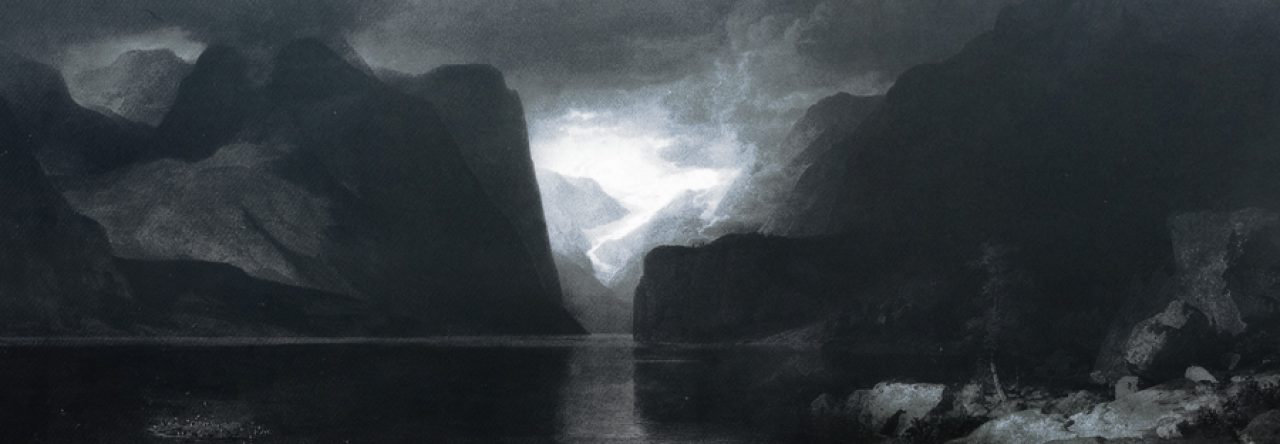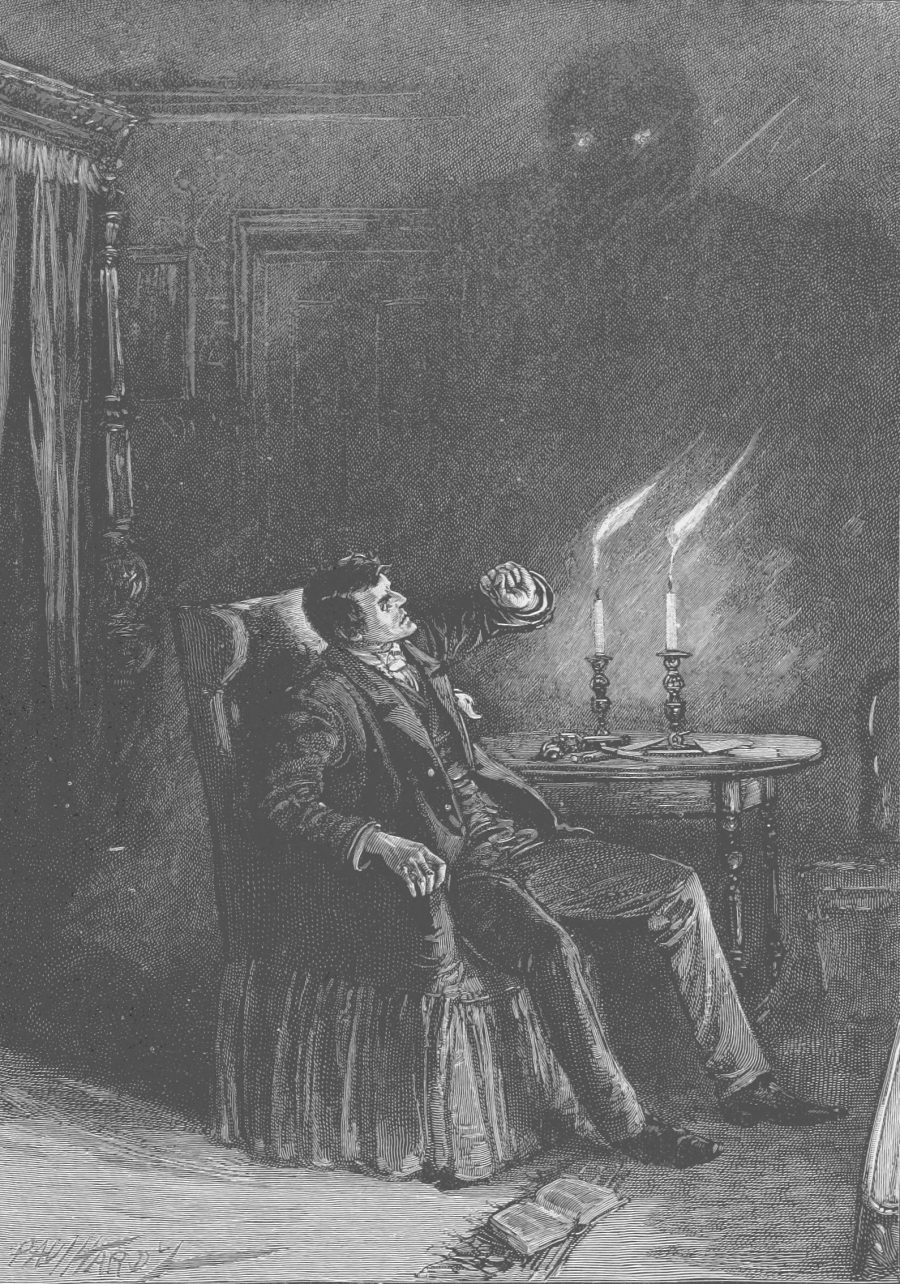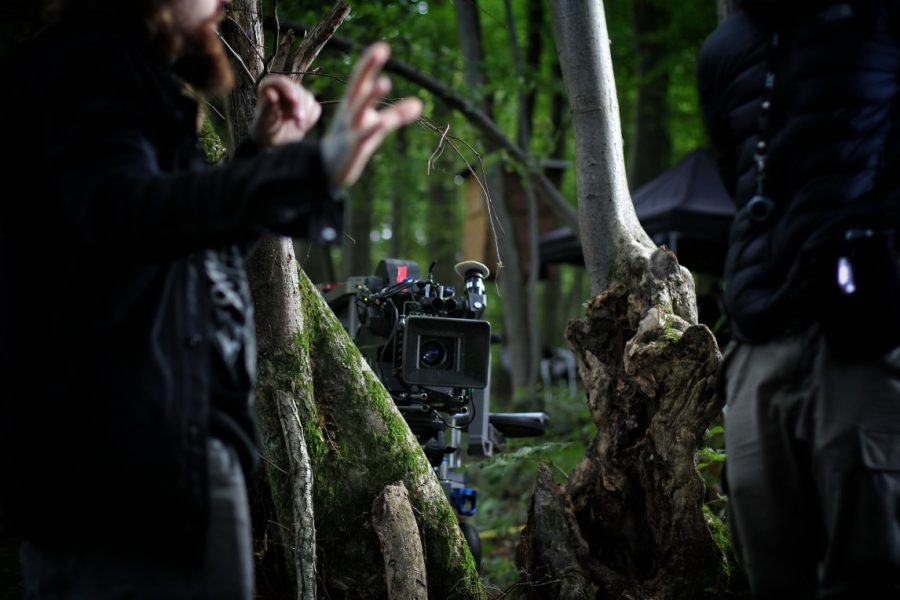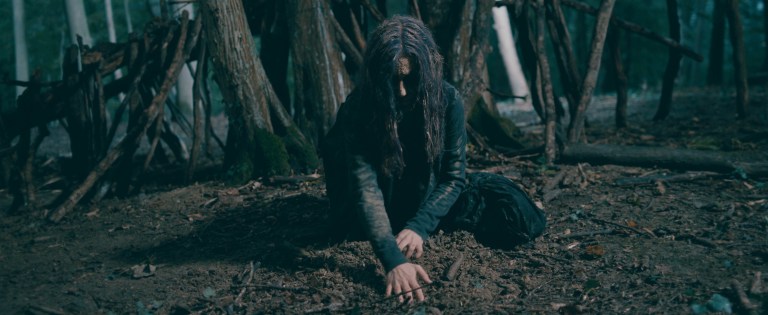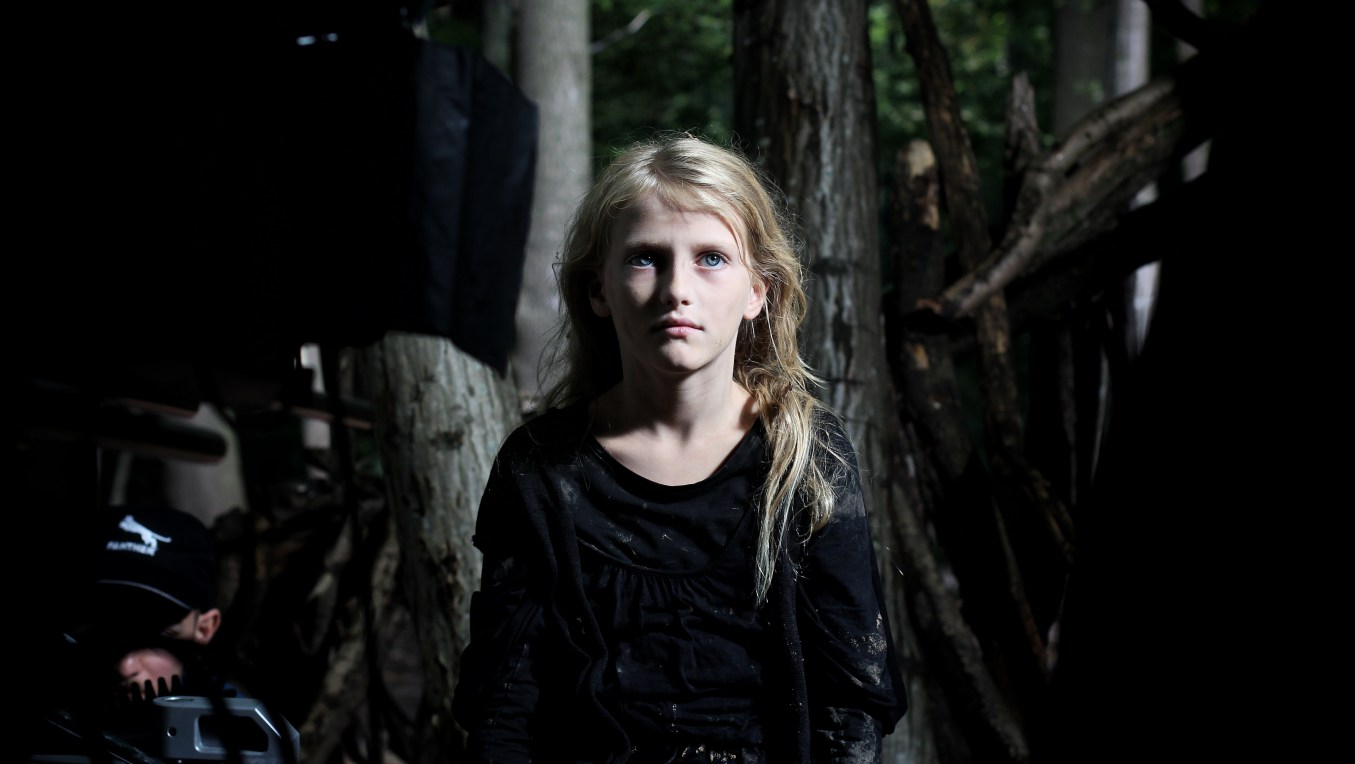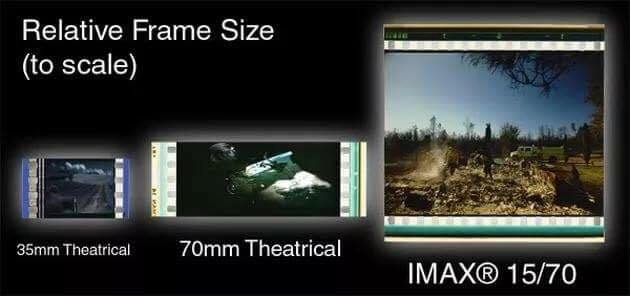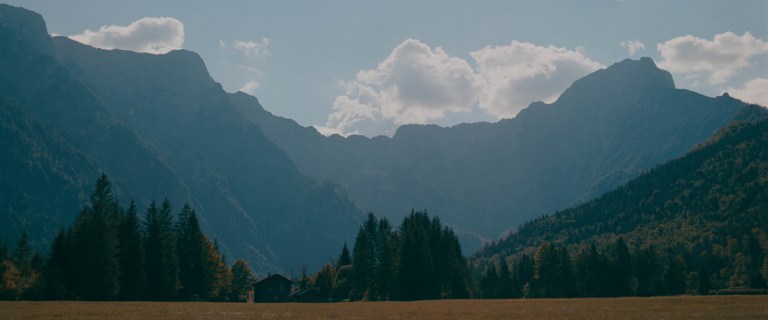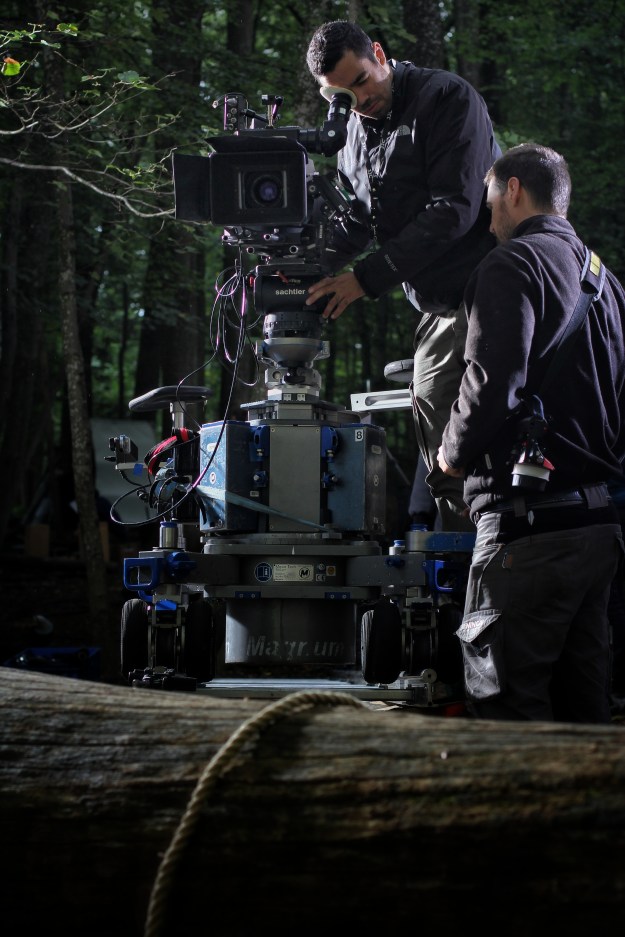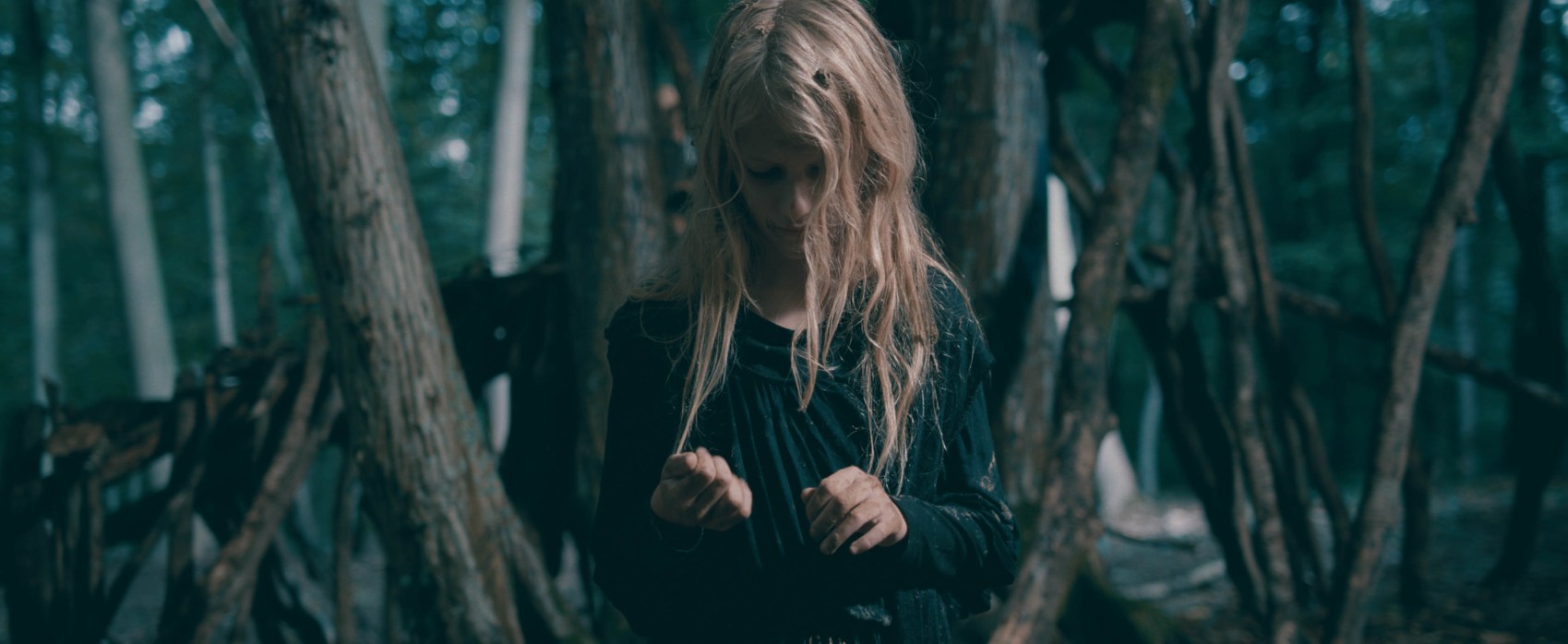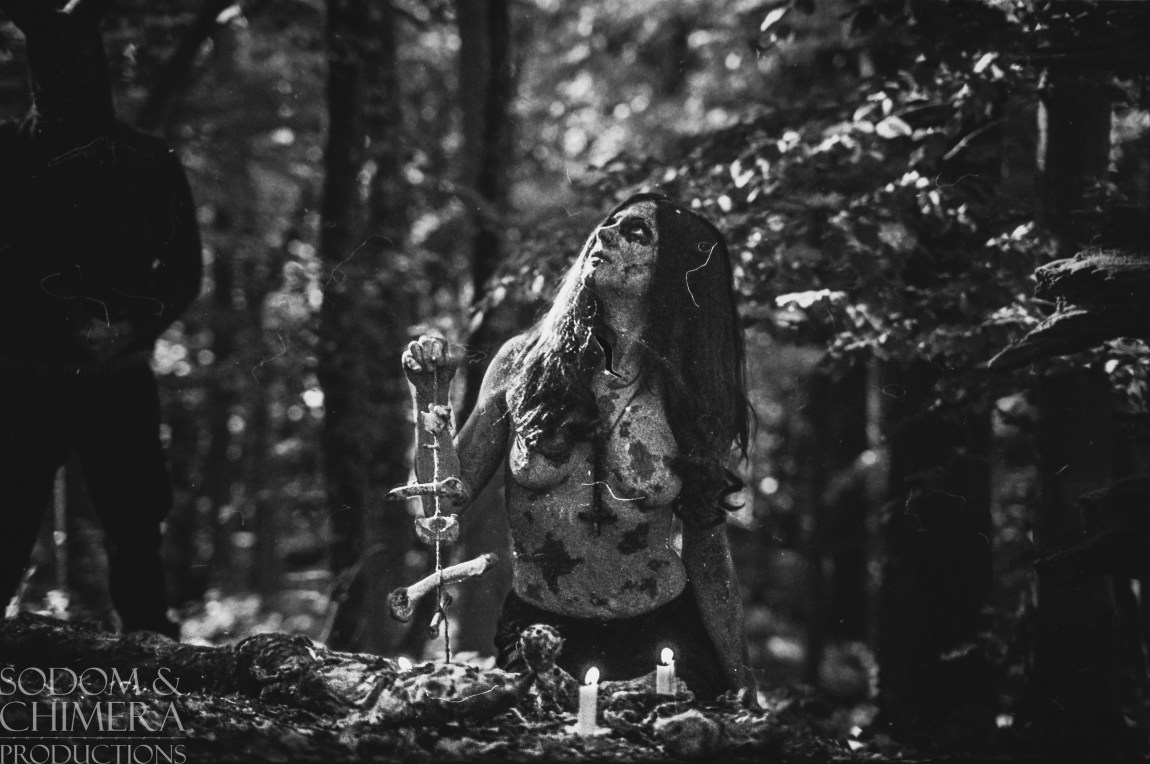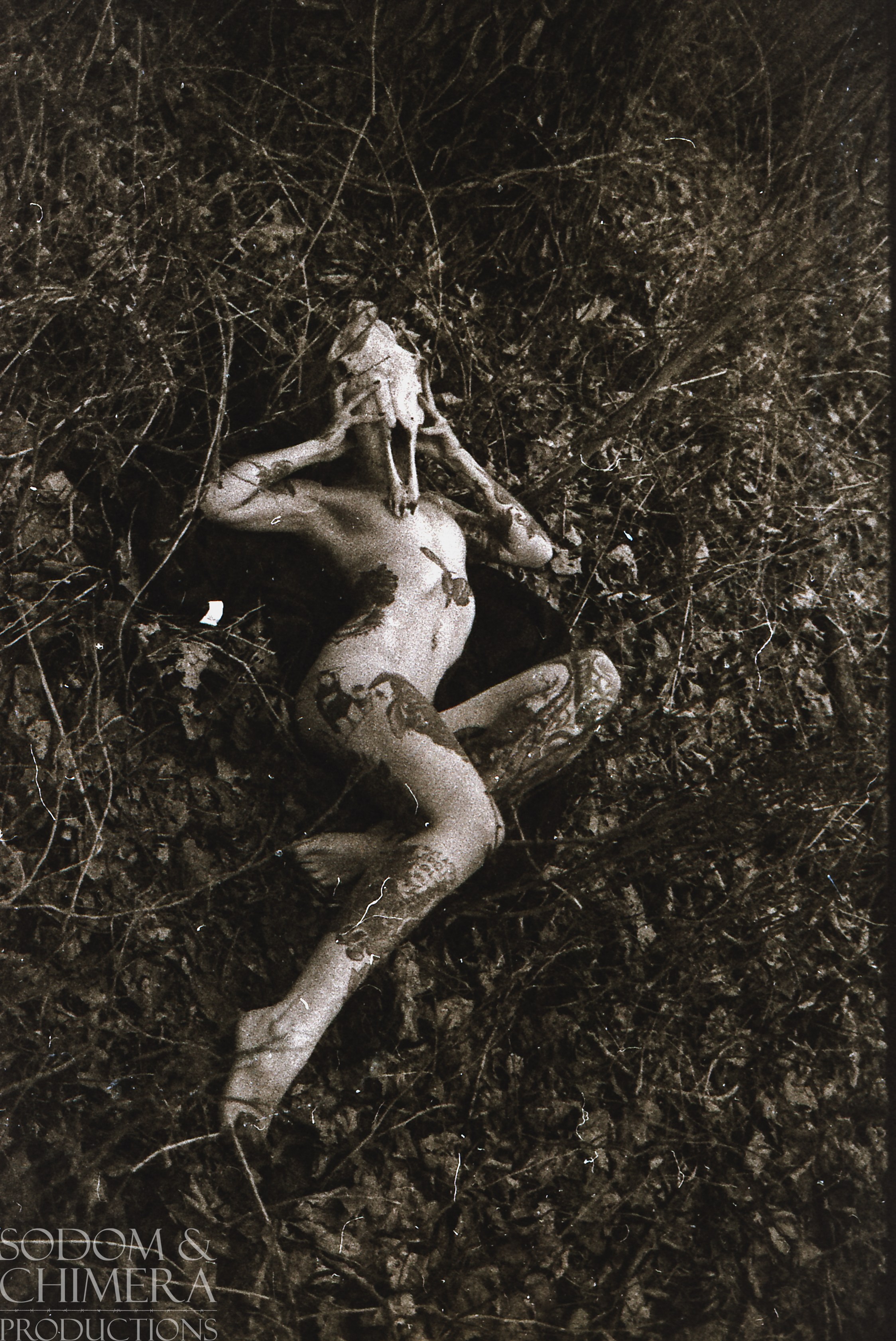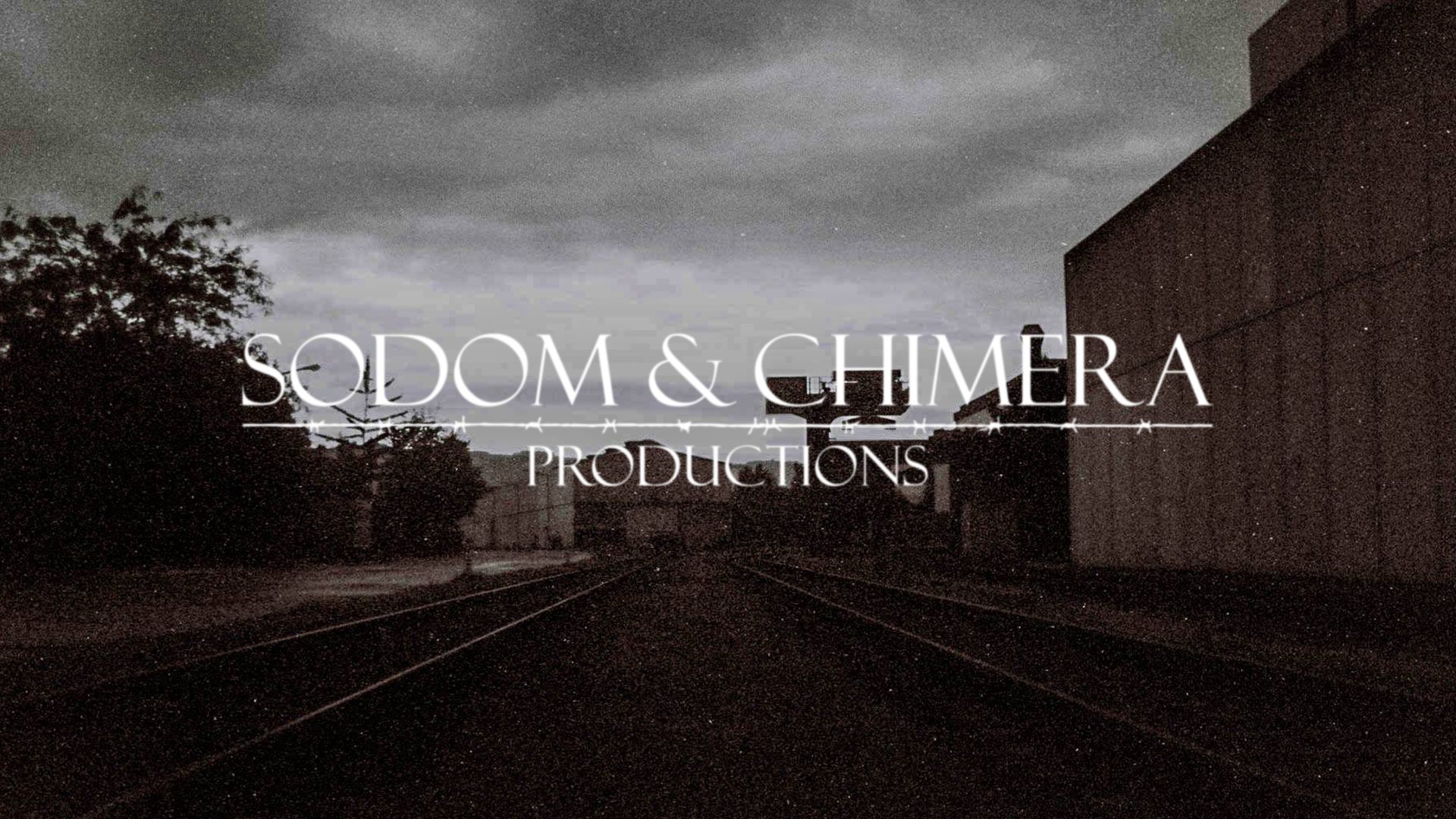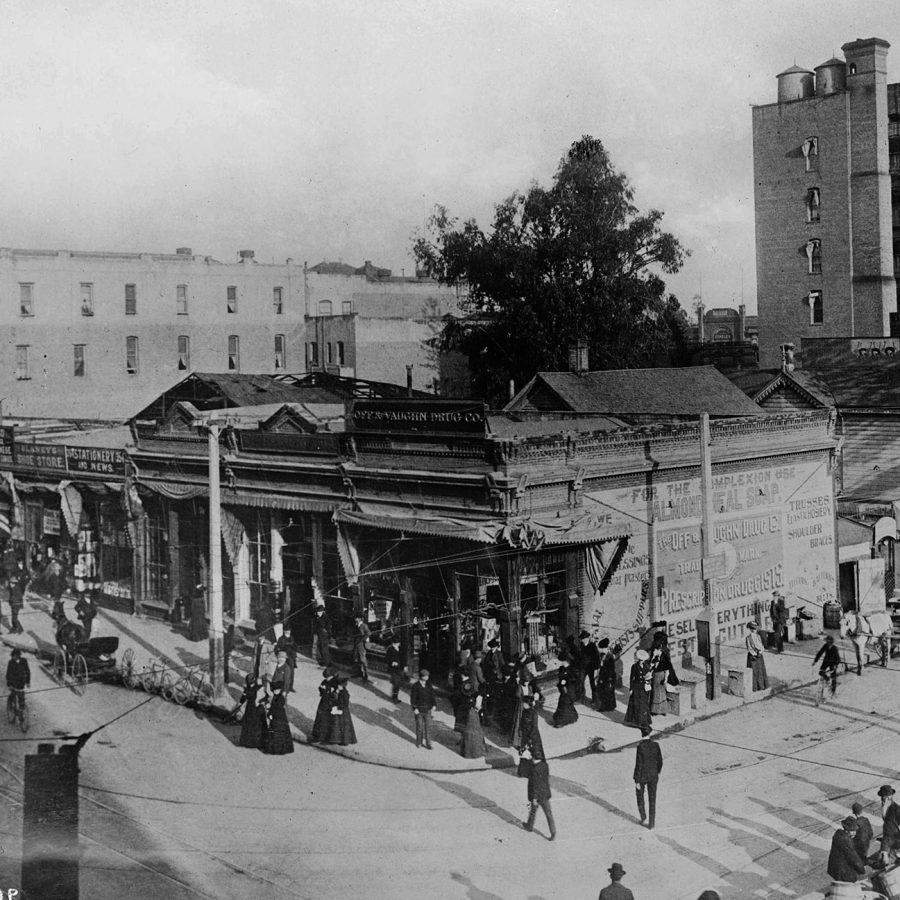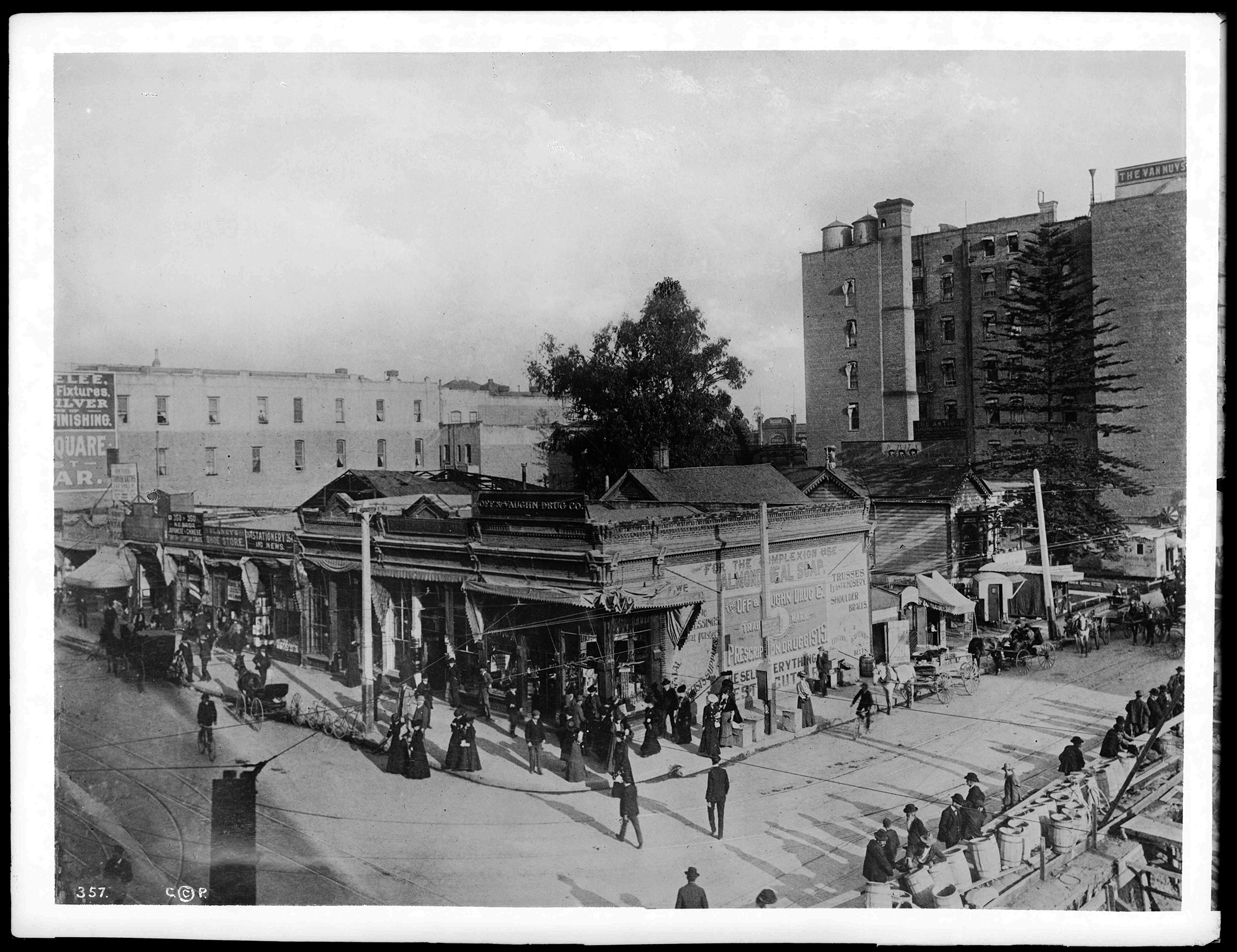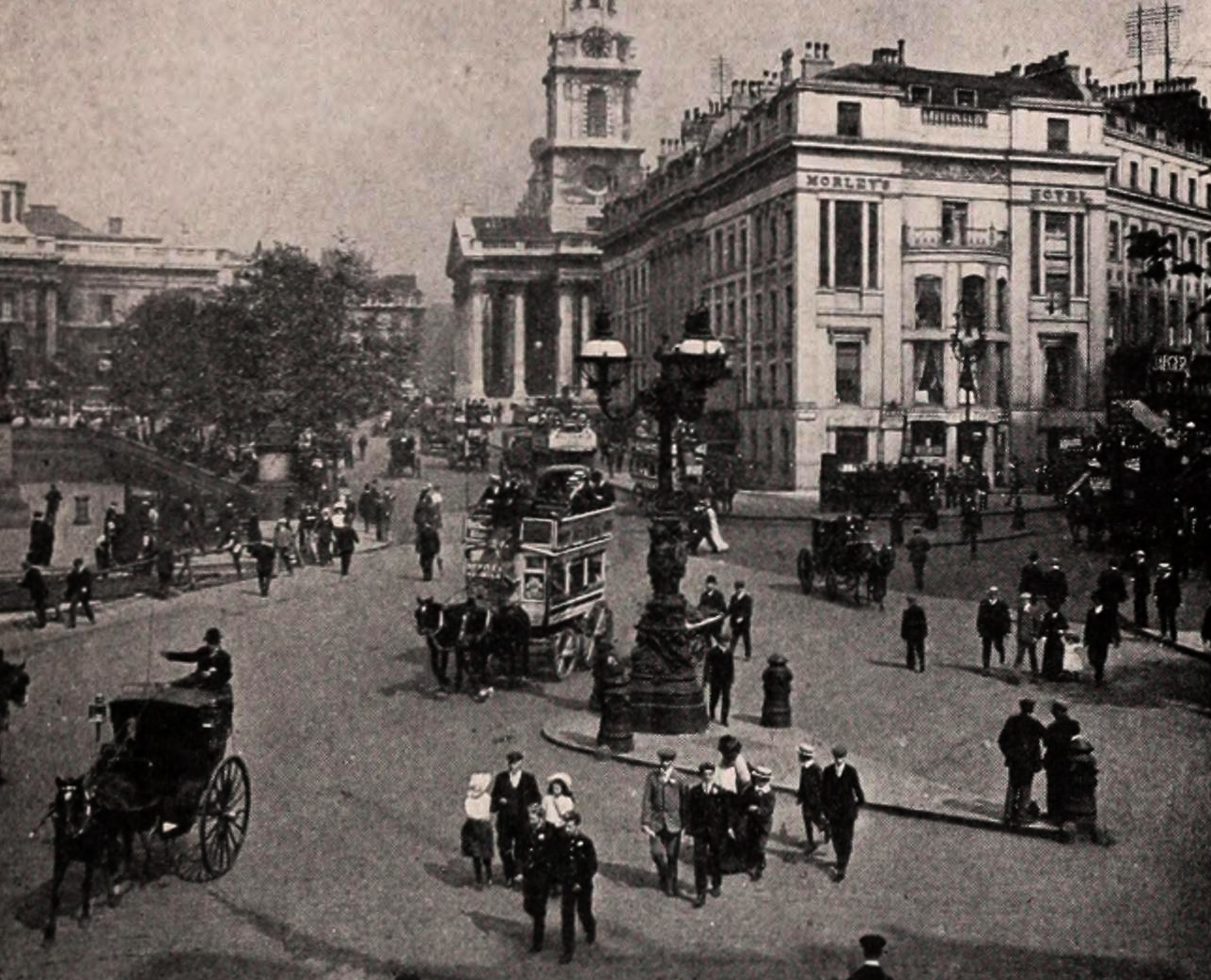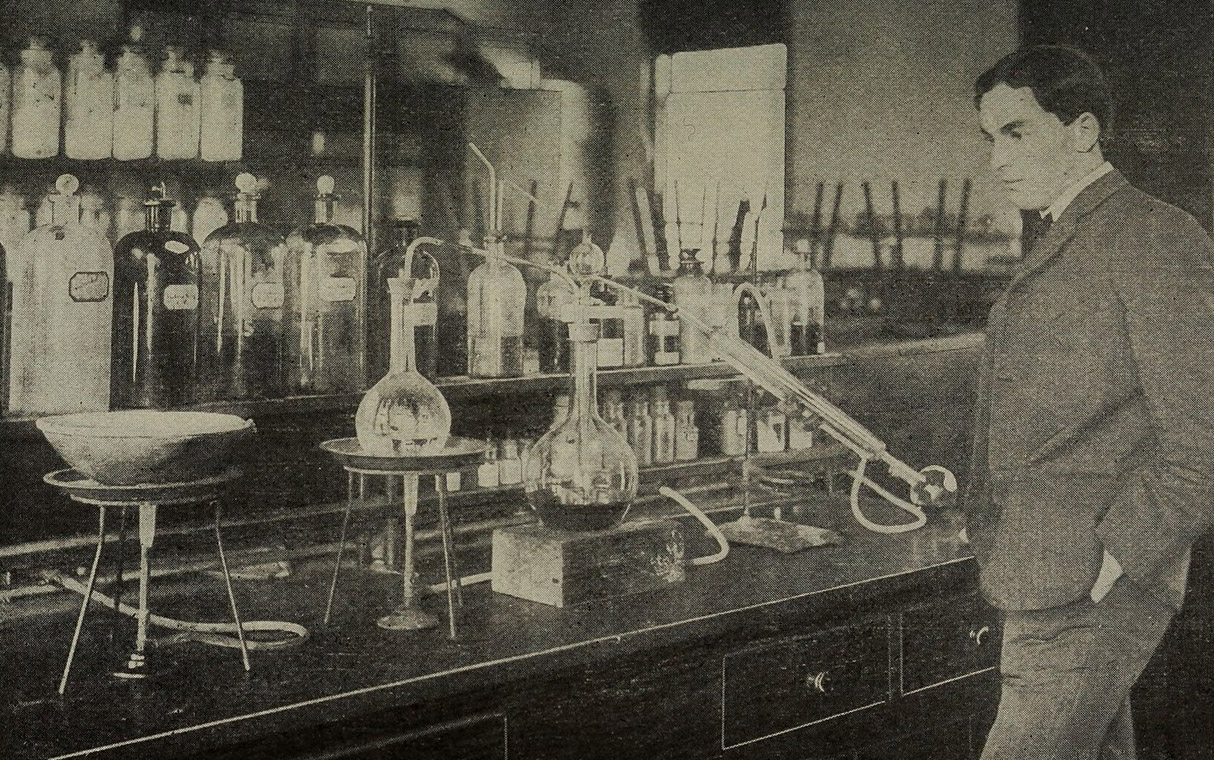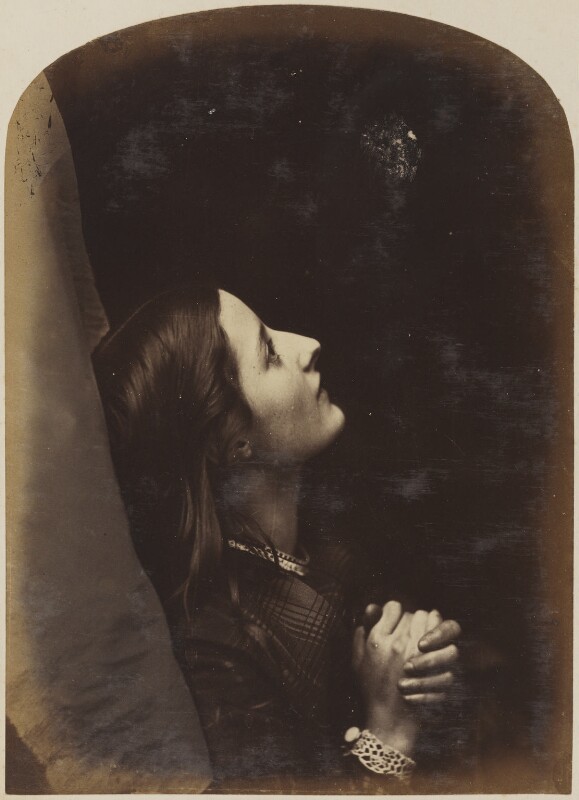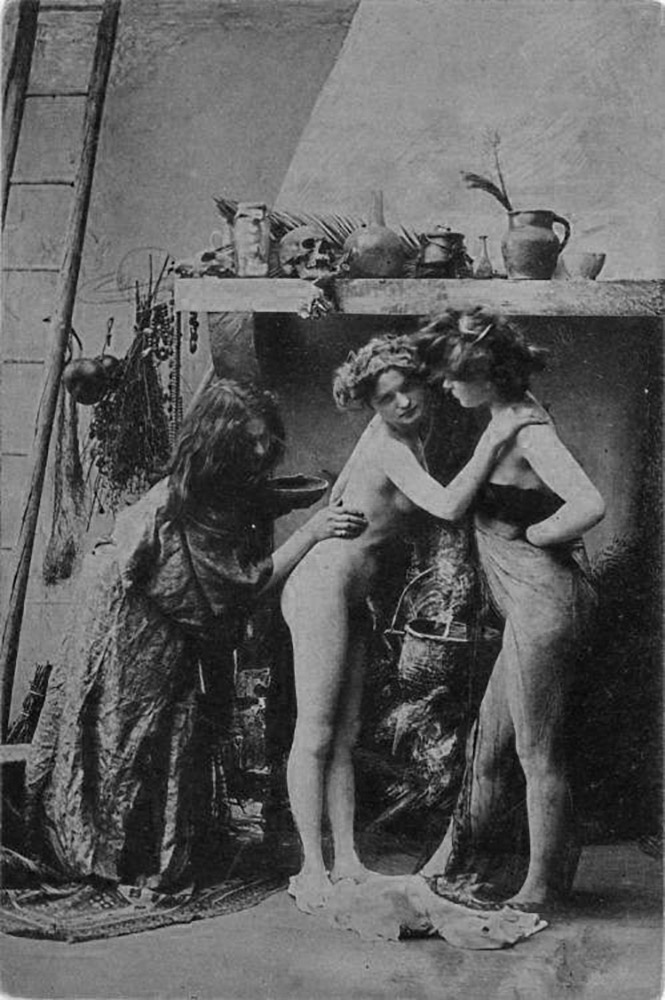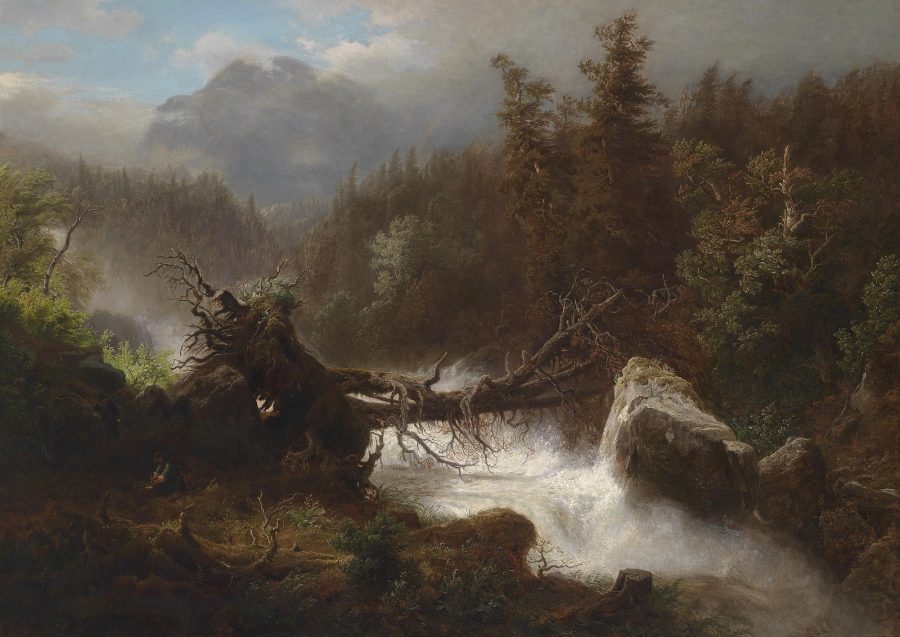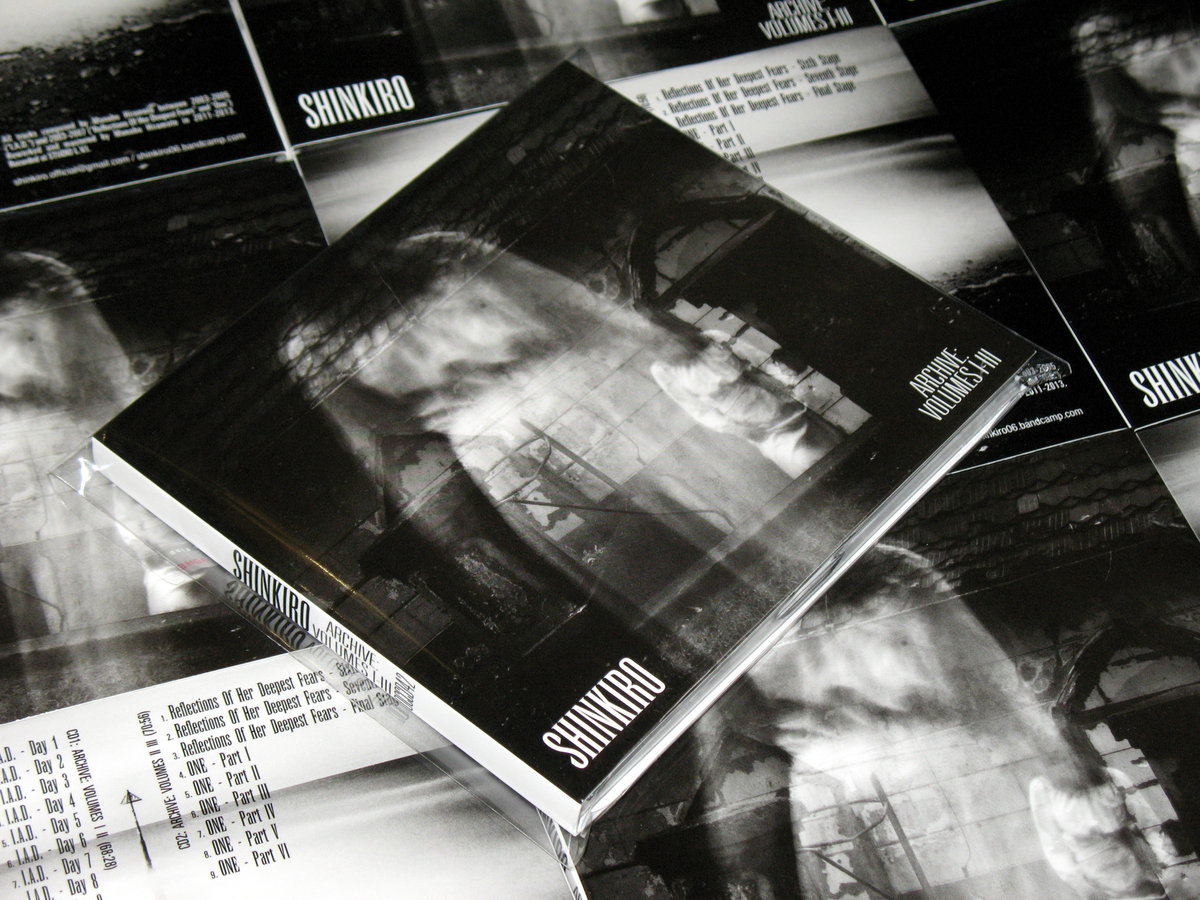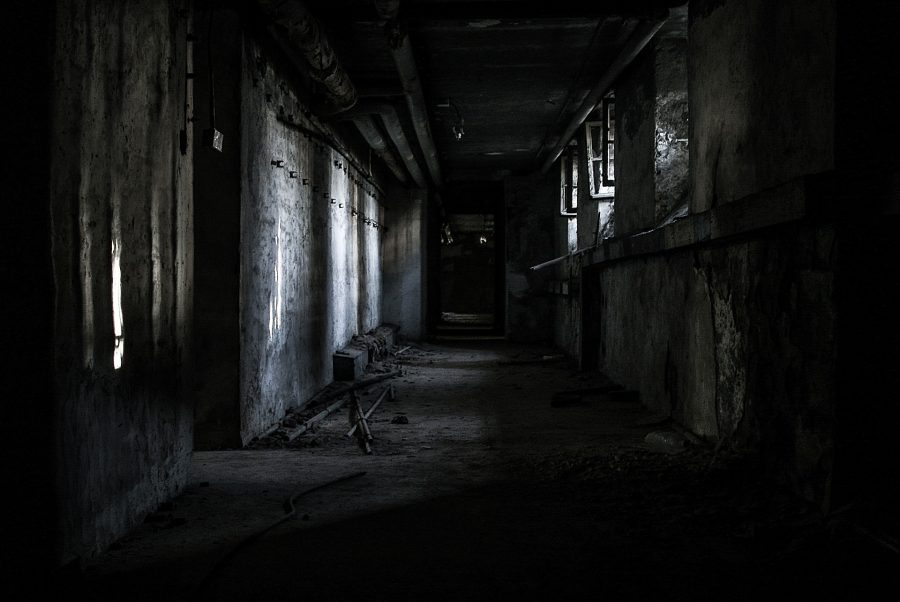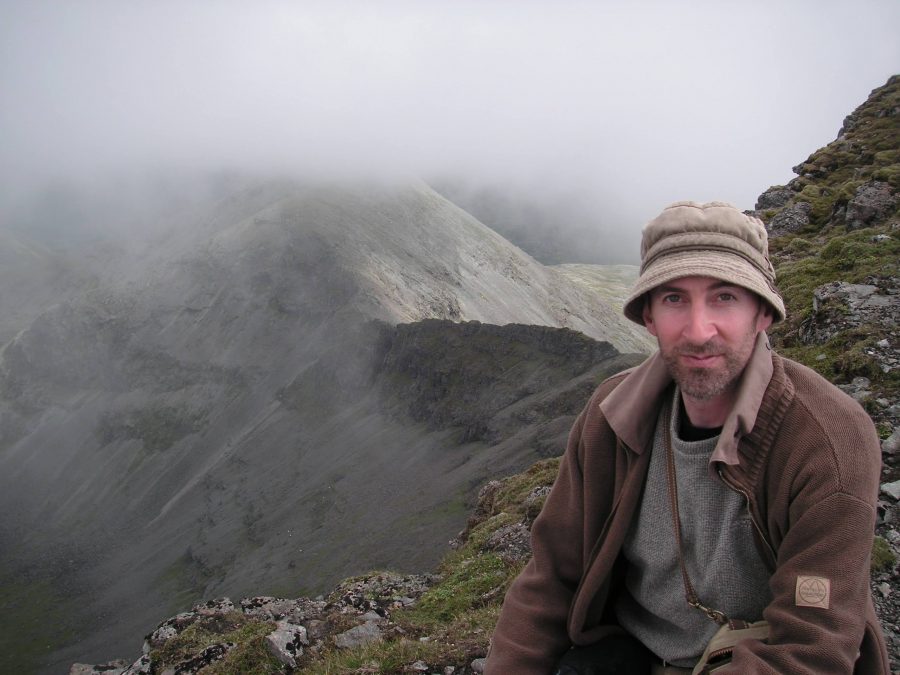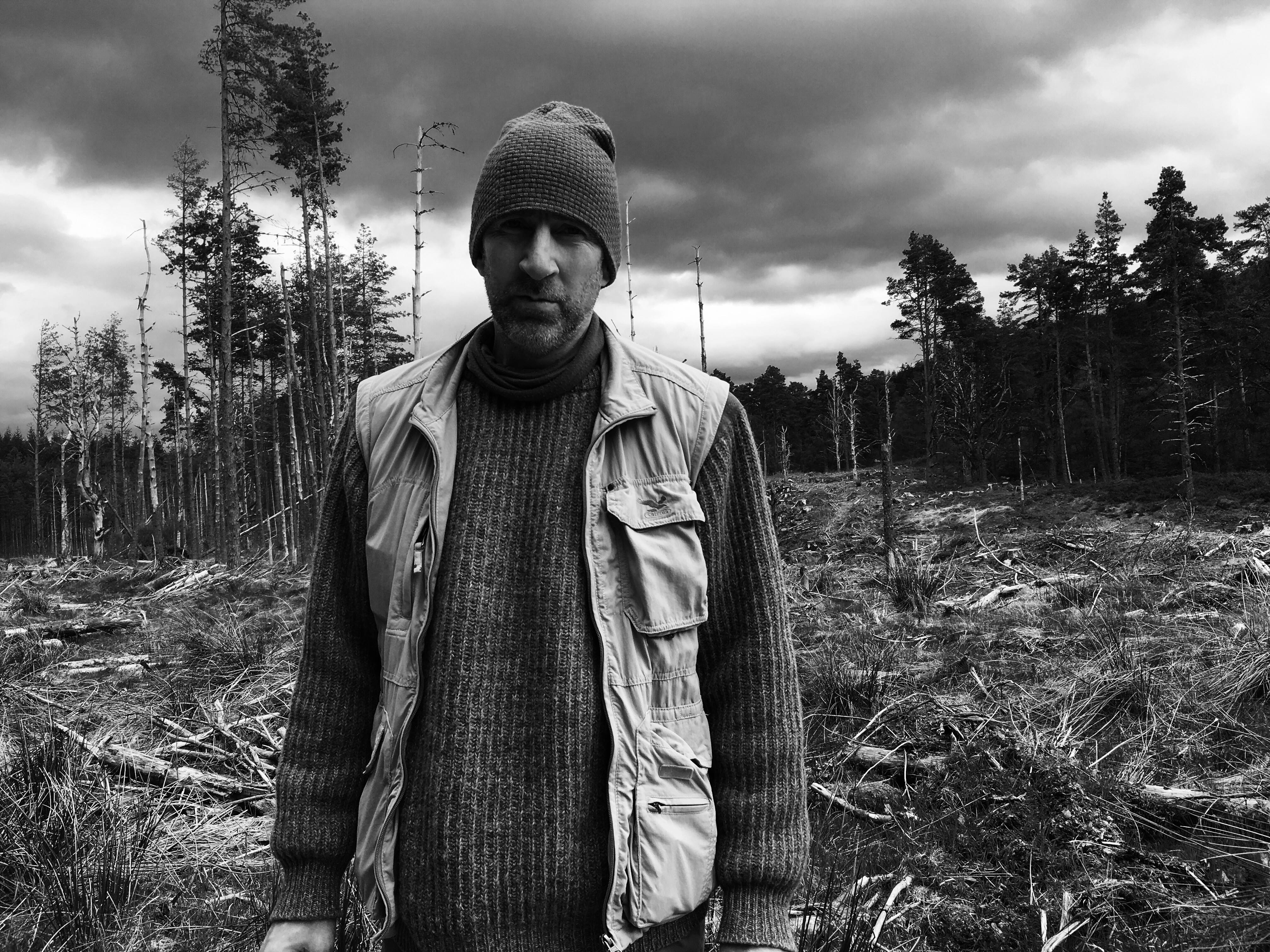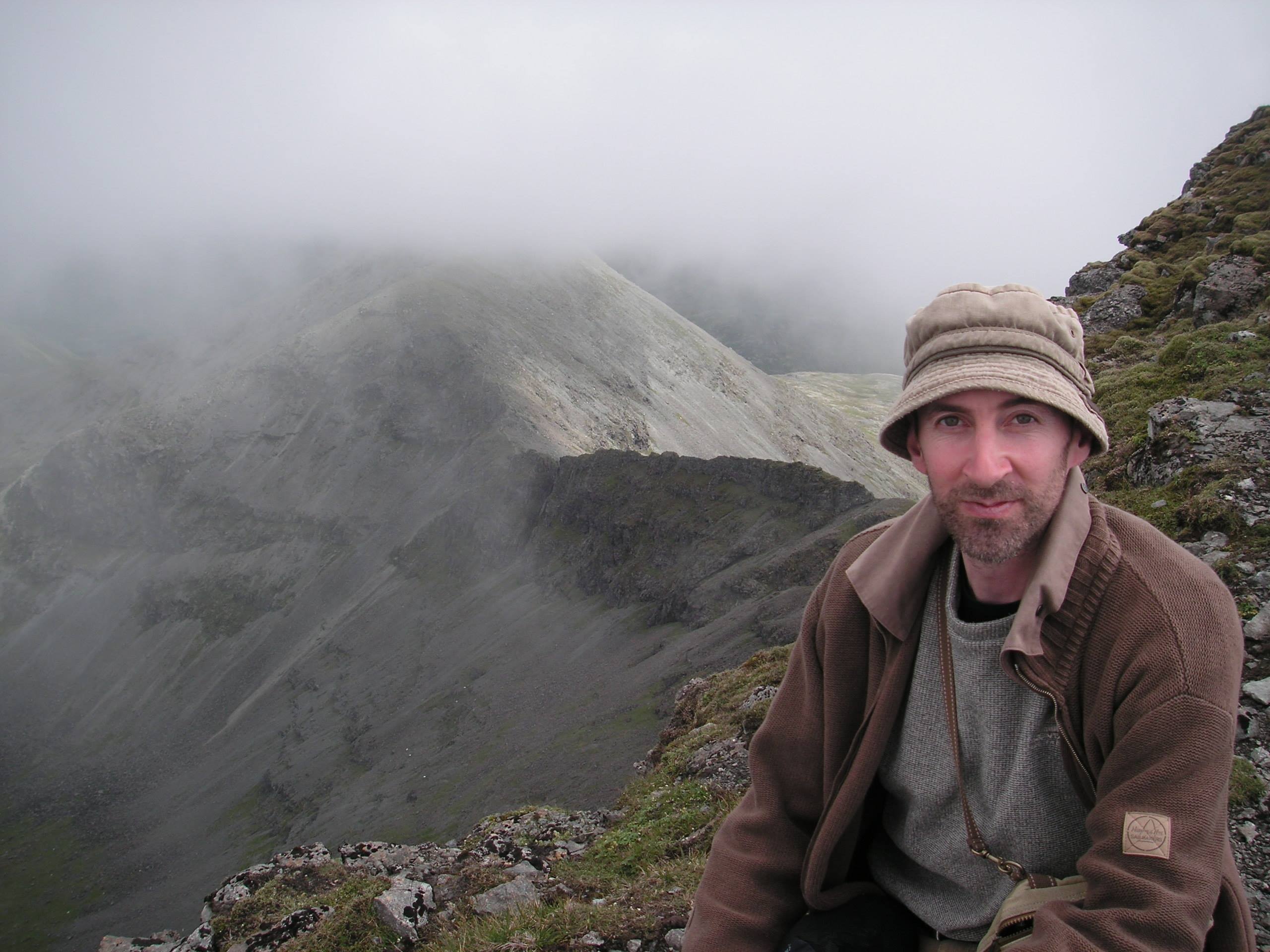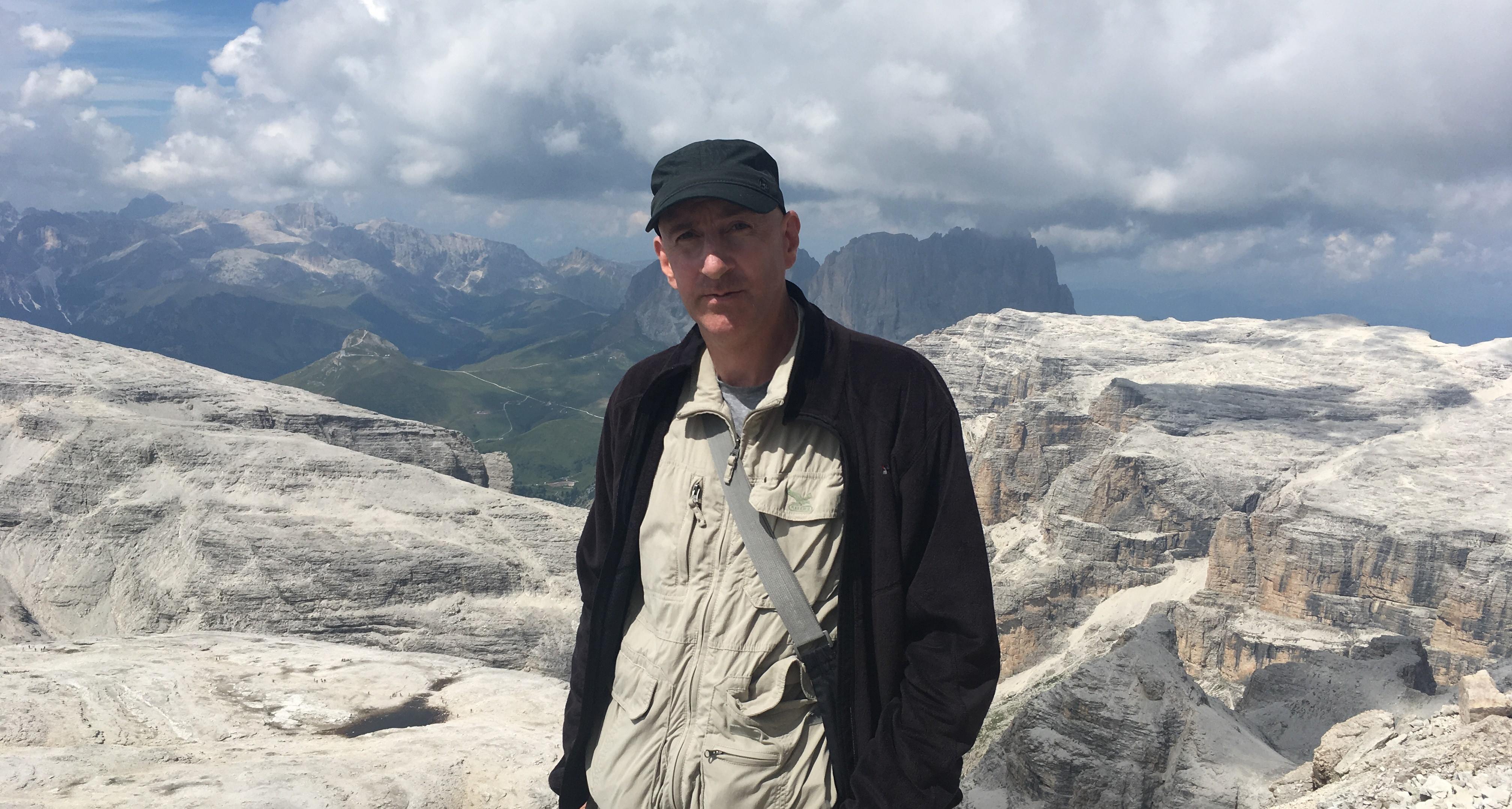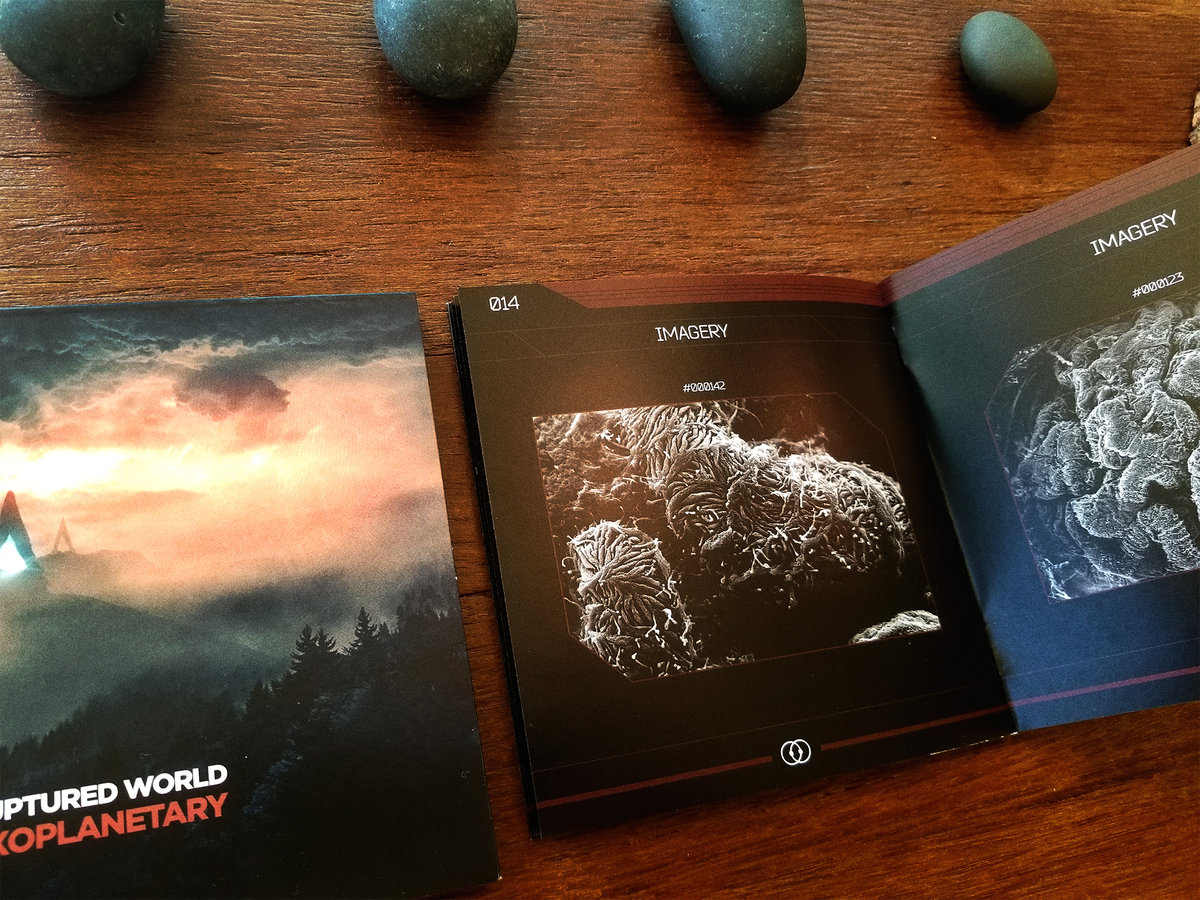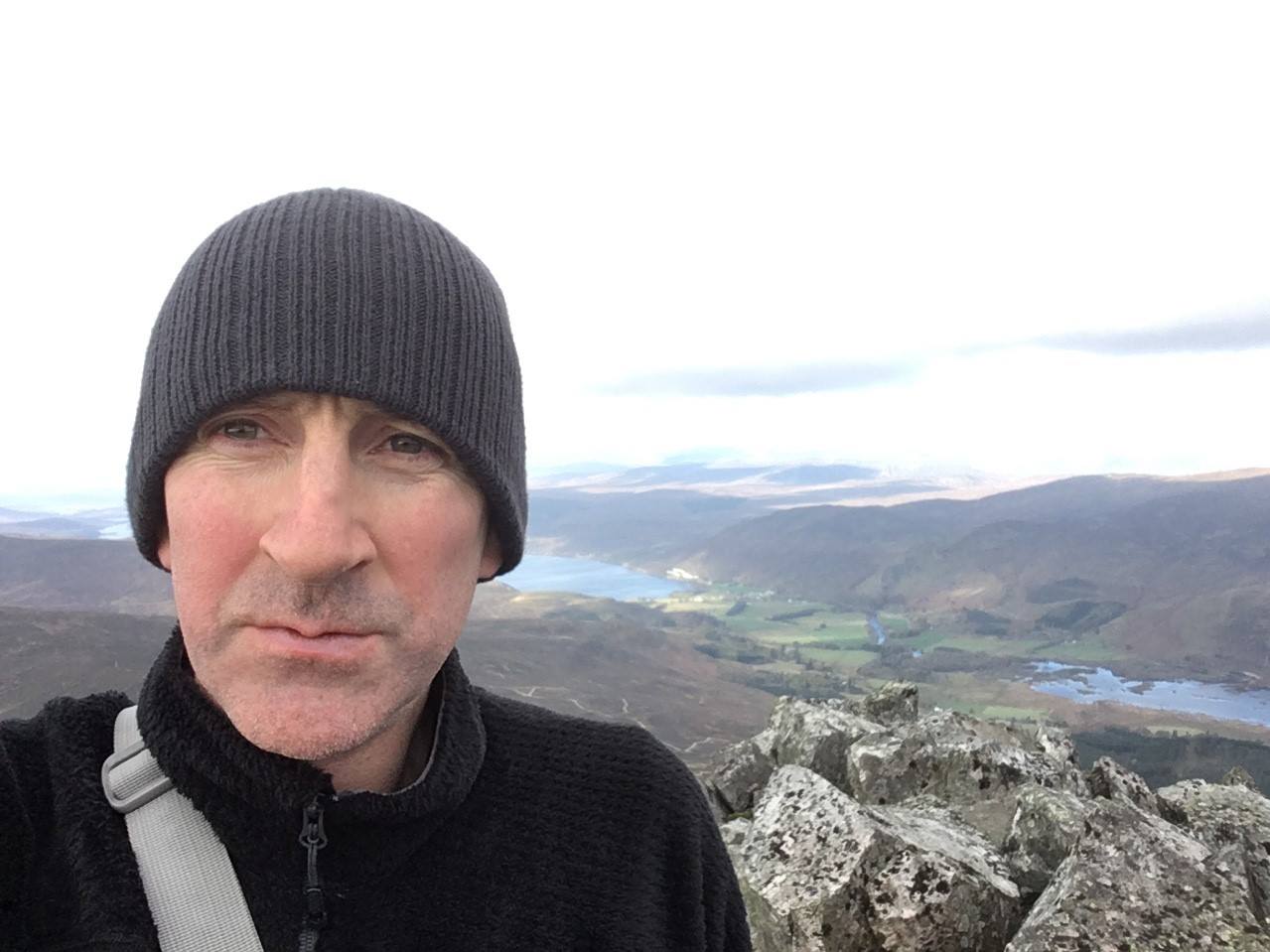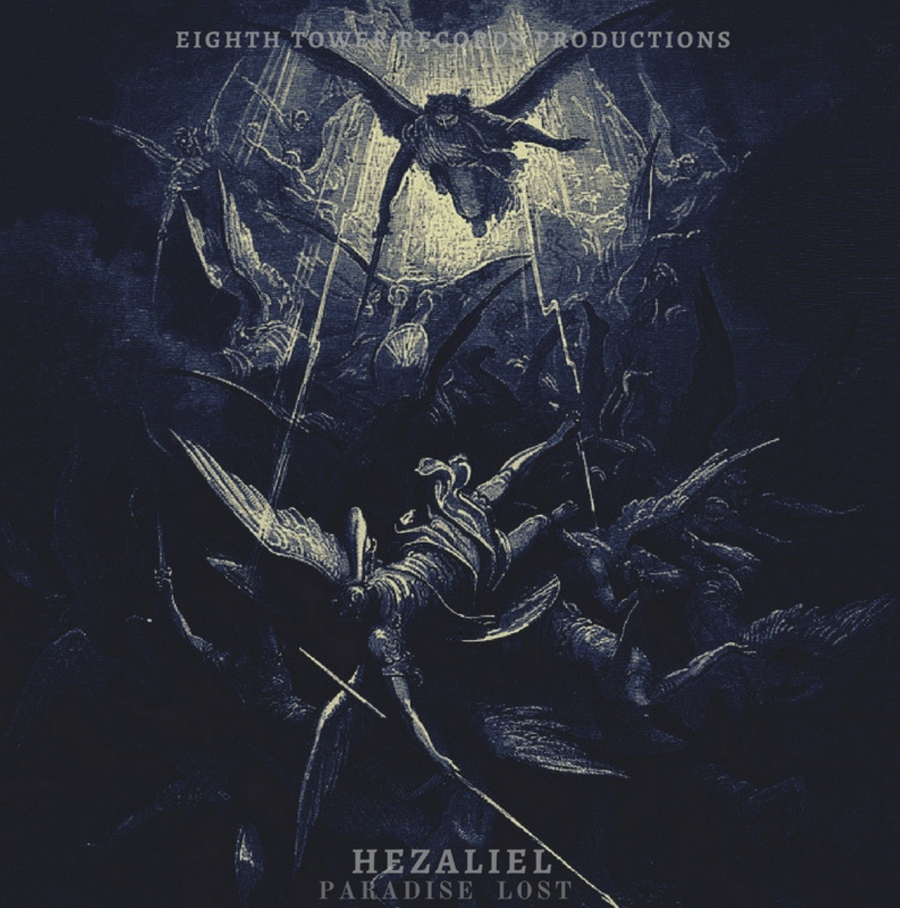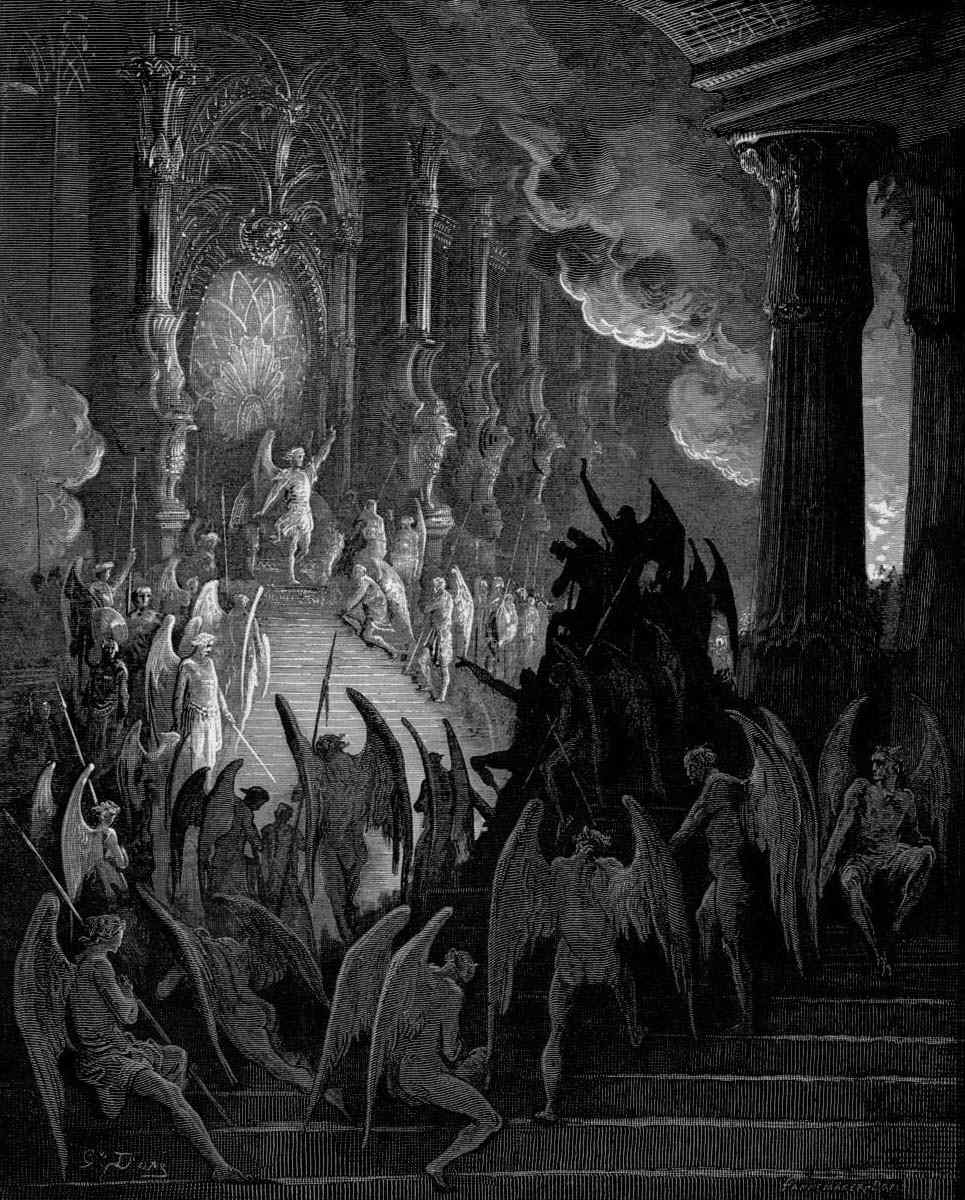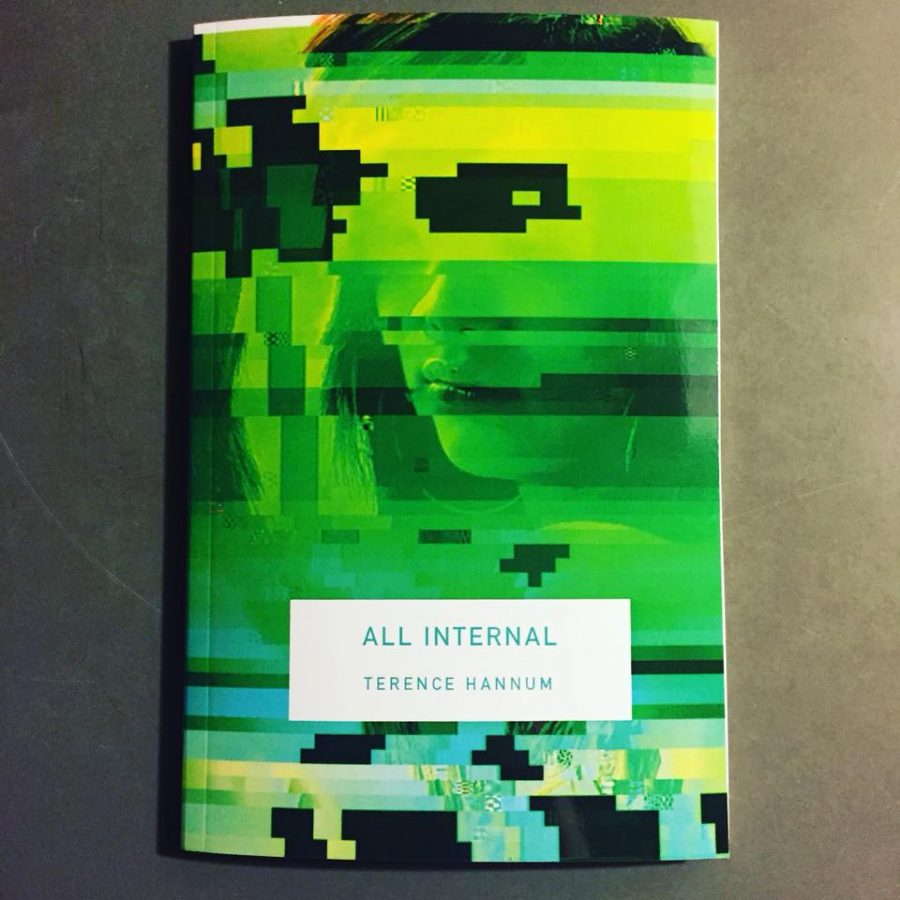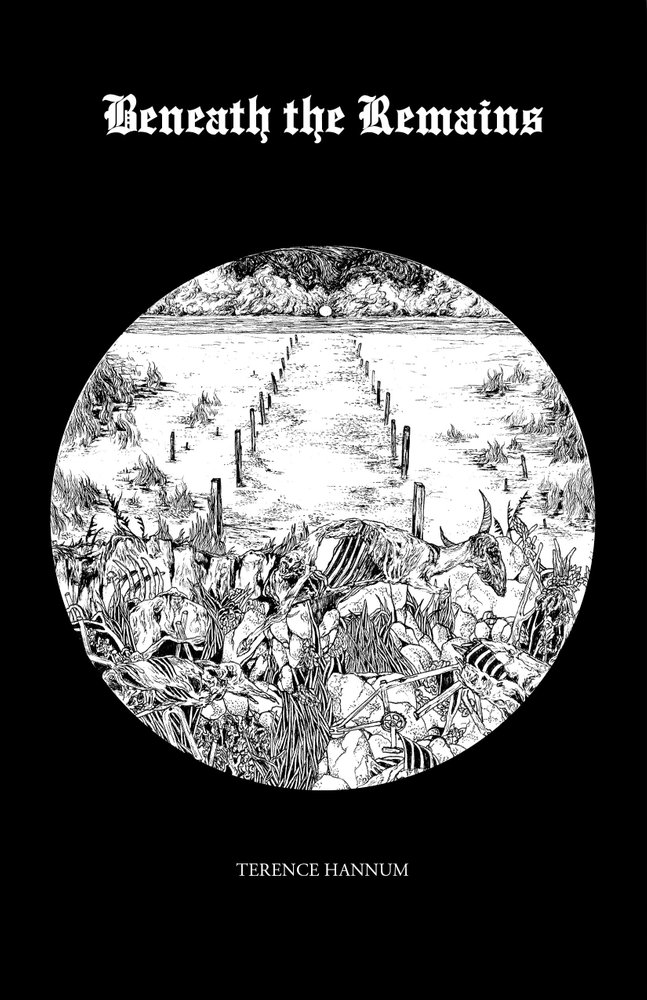We will be incorporating more works like this in the future. Full texts of old horror and weird fiction which has fallen into public domain, but is certainly still worthy of reading. We would greatly appreciate feedback on this feature. What sort of stories would you prefer? Longer? Shorter? Stupid idea? Let us know! Also we are keeping an eye open for new unpublished works by modern authors who may be looking for some extra exposure through the zine. So, please get in touch!
The format for this feature will be a mix of music inspired by the text, as well as a perfect companion to it’s reading. This means no distracting elements will be present, unless it is utterly warranted by the content of the text. The story will also be preceded by a brief foreword written and/or compiled by This Is Darkness.
Find the full tracklist w/ timestamps here.
THE WILLOWS
Algernon Blackwood
(1907)
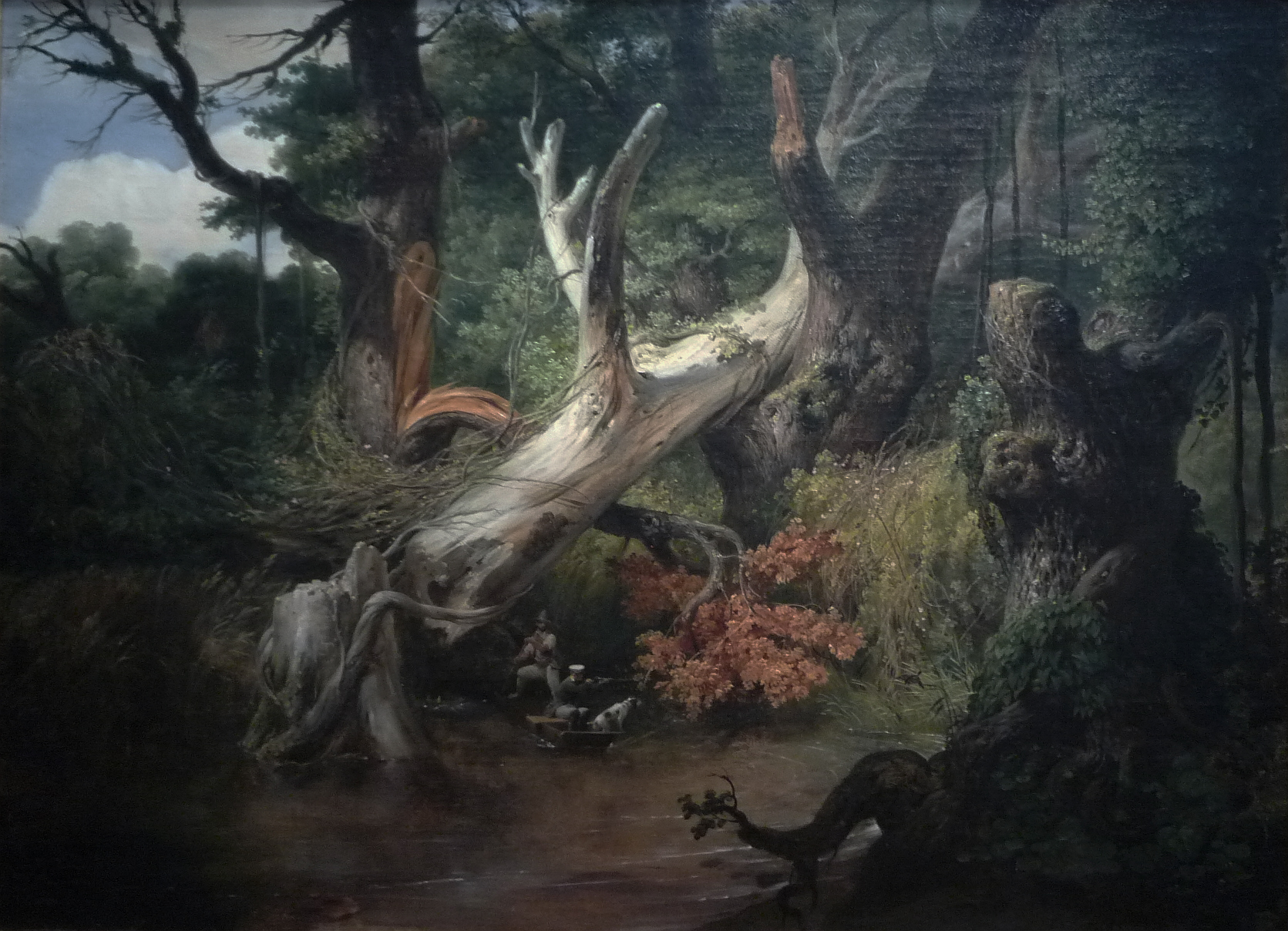
Horace Vernet – Hunting In The Pontine Marshes (1833)
Foreword
The Willows is one of the most popular stories by Algernon Blackwood. The novella was written as part of his 1907 collection The Listener and Other Stories. Among others, H.P. Lovecraft considered it to be his very favorite piece of weird fiction. Rather than fumble through a description for myself, I will leave it to the master. In his essay on weird fiction, Supernatural Horror in Literature (1927), H.P. Lovecraft writes:
“Less intense than Mr. Machen in delineating the extremes of stark fear, yet infinitely more closely wedded to the idea of an unreal world constantly pressing upon ours is the inspired and prolific Algernon Blackwood, amidst whose voluminous and uneven work may be found some of the finest spectral literature of this or any age. Of the quality of Mr. Blackwood’s genius there can be no dispute; for no one has even approached the skill, seriousness, and minute fidelity with which he records the overtones of strangeness in ordinary things and experiences, or the preternatural insight with which he builds up detail by detail the complete sensations and perceptions leading from reality into supernormal life or vision. Without notable command of the poetic witchery of mere words, he is the one absolute and unquestioned master of weird atmosphere; and can evoke what amounts almost to a story from a simple fragment of humourless psychological description. Above all others he understands how fully some sensitive minds dwell forever on the borderland of dream, and how relatively slight is the distinction betwixt those images formed from actual objects and those excited by the play of the imagination.
Mr. Blackwood’s lesser work is marred by several defects such as ethical didacticism, occasional insipid whimsicality, the flatness of benignant supernaturalism, and a too free use of the trade jargon of modem “occultism.” A fault of his more serious efforts is that diffuseness and long-windedness which results from an excessively elaborate attempt, under the handicap of a somewhat bald and journalistic style devoid of intrinsic magic, colour, and vitality, to visualise precise sensations and nuances of uncanny suggestion. But in spite of all this, the major products of Mr. Blackwood attain a genuinely classic level, and evoke as does nothing else in literature in awed convinced sense of the imminence of strange spiritual spheres of entities.
The well-nigh endless array of Mr. Blackwood’s fiction includes both novels and shorter tales, the latter sometimes independent and sometimes arrayed in series. Foremost of all must be reckoned The Willows, in which the nameless presences on a desolate Danube island are horribly felt and recognised by a pair of idle voyagers. Here art and restraint in narrative reach their very highest development, and an impression of lasting poignancy is produced without a, single strained passage or a single false note.”¹
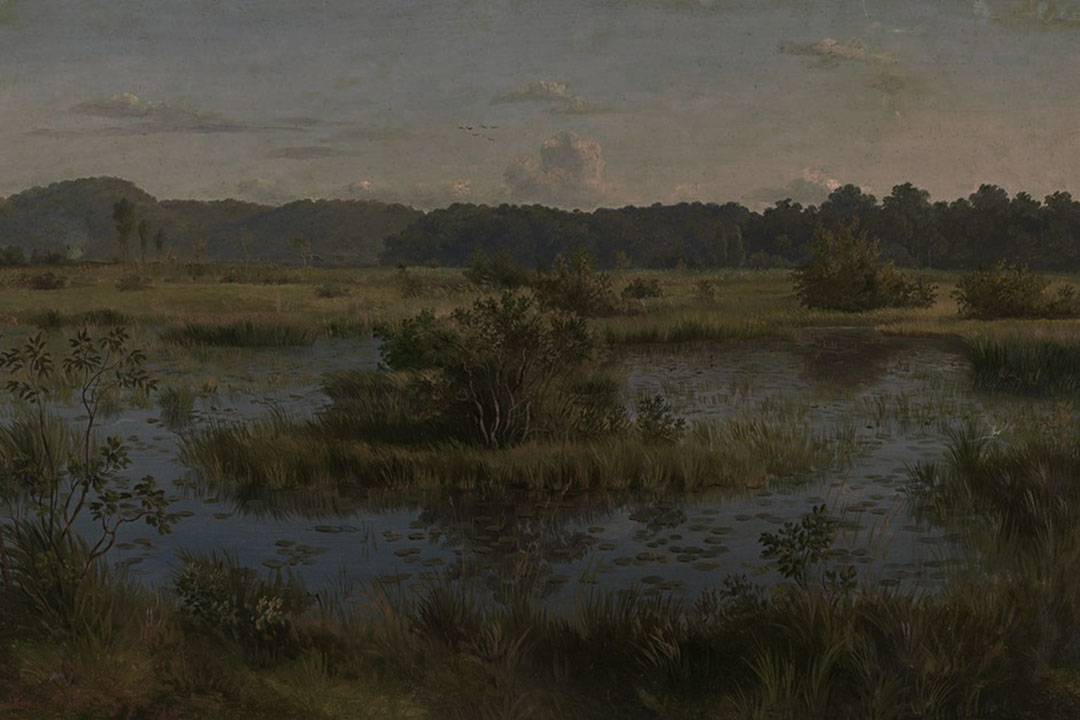
Von Guérard – Sumpfe nahe Erkrath 1841
I
After leaving Vienna, and long before you come to Budapest, the Danube enters a region of singular loneliness and desolation, where its waters spread away on all sides regardless of a main channel, and the country becomes a swamp for miles upon miles, covered by a vast sea of low willow-bushes. On the big maps this deserted area is painted in a fluffy blue, growing fainter in color as it leaves the banks, and across it may be seen in large straggling letters the word Sumpfe, meaning marshes.
In high flood this great acreage of sand, shingle-beds, and willow-grown islands is almost topped by the water, but in normal seasons the bushes bend and rustle in the free winds, showing their silver leaves to the sunshine in an ever-moving plain of bewildering beauty. These willows never attain to the dignity of trees; they have no rigid trunks; they remain humble bushes, with rounded tops and soft outline, swaying on slender stems that answer to the least pressure of the wind; supple as grasses, and so continually shifting that they somehow give the impression that the entire plain is moving and alive. For the wind sends waves rising and falling over the whole surface, waves of leaves instead of waves of water, green swells like the sea, too, until the branches turn and lift, and then silvery white as their underside turns to the sun.
Happy to slip beyond the control of the stern banks, the Danube here wanders about at will among the intricate network of channels intersecting the islands everywhere with broad avenues down which the waters pour with a shouting sound; making whirlpools, eddies, and foaming rapids; tearing at the sandy banks; carrying away masses of shore and willow-clumps; and forming new islands innumerably which shift daily in size and shape and possess at best an impermanent life, since the flood-time obliterates their very existence.
Properly speaking, this fascinating part of the river’s life begins soon after leaving Pressburg, and we, in our Canadian canoe, with gipsy tent and frying-pan on board, reached it on the crest of a rising flood about mid-July. That very same morning, when the sky was reddening before sunrise, we had slipped swiftly through still-sleeping Vienna, leaving it a couple of hours later a mere patch of smoke against the blue hills of the Wienerwald on the horizon; we had breakfasted below Fischeramend under a grove of birch trees roaring in the wind; and had then swept on the tearing current past Orth, Hainburg, Petronell (the old Roman Carnuntum of Marcus Aurelius), and so under the frowning heights of Thelsen on a spur of the Carpathians, where the March steals in quietly from the left and the frontier is crossed between Austria and Hungary.
Racing along at twelve kilometers an hour soon took us well into Hungary, and the muddy waters—sure sign of flood—sent us aground on many a shingle-bed, and twisted us like a cork in many a sudden belching whirlpool before the towers of Pressburg (Hungarian, Poszony) showed against the sky; and then the canoe, leaping like a spirited horse, flew at top speed under the grey walls, negotiated safely the sunken chain of the Fliegende Brucke ferry, turned the corner sharply to the left, and plunged on yellow foam into the wilderness of islands, sandbanks, and swamp-land beyond—the land of the willows.
The change came suddenly, as when a series of bioscope pictures snaps down on the streets of a town and shifts without warning into the scenery of lake and forest. We entered the land of desolation on wings, and in less than half an hour there was neither boat nor fishing-hut nor red roof, nor any single sign of human habitation and civilization within sight. The sense of remoteness from the world of humankind, the utter isolation, the fascination of this singular world of willows, winds, and waters, instantly laid its spell upon us both, so that we allowed laughingly to one another that we ought by rights to have held some special kind of passport to admit us, and that we had, somewhat audaciously, come without asking leave into a separate little kingdom of wonder and magic—a kingdom that was reserved for the use of others who had a right to it, with everywhere unwritten warnings to trespassers for those who had the imagination to discover them.
Though still early in the afternoon, the ceaseless buffetings of a most tempestuous wind made us feel weary, and we at once began casting about for a suitable camping-ground for the night. But the bewildering character of the islands made landing difficult; the swirling flood carried us in shore and then swept us out again; the willow branches tore our hands as we seized them to stop the canoe, and we pulled many a yard of sandy bank into the water before at length we shot with a great sideways blow from the wind into a backwater and managed to beach the bows in a cloud of spray. Then we lay panting and laughing after our exertions on the hot yellow sand, sheltered from the wind, and in the full blaze of a scorching sun, a cloudless blue sky above, and an immense army of dancing, shouting willow bushes, closing in from all sides, shining with spray and clapping their thousand little hands as though to applaud the success of our efforts.
“What a river!” I said to my companion, thinking of all the way we had traveled from the source in the Black Forest, and how he had often been obliged to wade and push in the upper shallows at the beginning of June.
“Won’t stand much nonsense now, will it?” he said, pulling the canoe a little farther into safety up the sand, and then composing himself for a nap.
I lay by his side, happy and peaceful in the bath of the elements—water, wind, sand, and the great fire of the sun—thinking of the long journey that lay behind us, and of the great stretch before us to the Black Sea, and how lucky I was to have such a delightful and charming traveling companion as my friend, the Swede.
We had made many similar journeys together, but the Danube, more than any other river I knew, impressed us from the very beginning with its aliveness. From its tiny bubbling entry into the world among the pinewood gardens of Donaueschingen, until this moment when it began to play the great river-game of losing itself among the deserted swamps, unobserved, unrestrained, it had seemed to us like following the grown of some living creature. Sleepy at first, but later developing violent desires as it became conscious of its deep soul, it rolled, like some huge fluid being, through all the countries we had passed, holding our little craft on its mighty shoulders, playing roughly with us sometimes, yet always friendly and well-meaning, till at length we had come inevitably to regard it as a Great Personage.
How, indeed, could it be otherwise, since it told us so much of its secret life? At night we heard it singing to the moon as we lay in our tent, uttering that odd sibilant note peculiar to itself and said to be caused by the rapid tearing of the pebbles along its bed, so great is its hurrying speed. We knew, too, the voice of its gurgling whirlpools, suddenly bubbling up on a surface previously quite calm; the roar of its shallows and swift rapids; its constant steady thundering below all mere surface sounds; and that ceaseless tearing of its icy waters at the banks. How it stood up and shouted when the rains fell flat upon its face! And how its laughter roared out when the wind blew up-stream and tried to stop its growing speed! We knew all its sounds and voices, its tumblings and foamings, its unnecessary splashing against the bridges; that self-conscious chatter when there were hills to look on; the affected dignity of its speech when it passed through the little towns, far too important to laugh; and all these faint, sweet whisperings when the sun caught it fairly in some slow curve and poured down upon it till the steam rose.
It was full of tricks, too, in its early life before the great world knew it. There were places in the upper reaches among the Swabian forests, when yet the first whispers of its destiny had not reached it, where it elected to disappear through holes in the ground, to appear again on the other side of the porous limestone hills and start a new river with another name; leaving, too, so little water in its own bed that we had to climb out and wade and push the canoe through miles of shallows.
And a chief pleasure, in those early days of its irresponsible youth, was to lie low, like Brer Fox, just before the little turbulent tributaries came to join it from the Alps, and to refuse to acknowledge them when in, but to run for miles side by side, the dividing line well marked, the very levels different, the Danube utterly declining to recognize the newcomer. Below Passau, however, it gave up this particular trick, for there the Inn comes in with a thundering power impossible to ignore, and so pushes and incommodes the parent river that there is hardly room for them in the long twisting gorge that follows, and the Danube is shoved this way and that against the cliffs, and forced to hurry itself with great waves and much dashing to and fro in order to get through in time. And during the fight our canoe slipped down from its shoulder to its breast, and had the time of its life among the struggling waves. But the Inn taught the old river a lesson, and after Passau it no longer pretended to ignore new arrivals.
This was many days back, of course, and since then we had come to know other aspects of the great creature, and across the Bavarian wheat plain of Straubing she wandered so slowly under the blazing June sun that we could well imagine only the surface inches were water, while below there moved, concealed as by a silken mantle, a whole army of Undines, passing silently and unseen down to the sea, and very leisurely too, lest they be discovered.
Much, too, we forgave her because of her friendliness to the birds and animals that haunted the shores. Cormorants lined the banks in lonely places in rows like short black palings; grey crows crowded the shingle-beds; storks stood fishing in the vistas of shallower water that opened up between the islands, and hawks, swans, and marsh birds of all sorts filled the air with glinting wings and singing, petulant cries. It was impossible to feel annoyed with the river’s vagaries after seeing a deer leap with a splash into the water at sunrise and swim past the bows of the canoe; and often we saw fawns peering at us from the underbrush, or looked straight into the brown eyes of a stag as we charged full tilt round a corner and entered another reach of the river. Foxes, too, everywhere haunted the banks, tripping daintily among the driftwood and disappearing so suddenly that it was impossible to see how they managed it.
But now, after leaving Pressburg, everything changed a little, and the Danube became more serious. It ceased trifling. It was half-way to the Black Sea, within seeming distance almost of other, stranger countries where no tricks would be permitted or understood. It became suddenly grown-up, and claimed our respect and even our awe. It broke out into three arms, for one thing, that only met again a hundred kilometers farther down, and for a canoe there were no indications which one was intended to be followed.
“If you take a side channel,” said the Hungarian officer we met in the Pressburg shop while buying provisions, “you may find yourselves, when the flood subsides, forty miles from anywhere, high and dry, and you may easily starve. There are no people, no farms, no fishermen. I warn you not to continue. The river, too, is still rising, and this wind will increase.”
The rising river did not alarm us in the least, but the matter of being left high and dry by a sudden subsidence of the waters might be serious, and we had consequently laid in an extra stock of provisions. For the rest, the officer’s prophecy held true, and the wind, blowing down a perfectly clear sky, increased steadily till it reached the dignity of a westerly gale.
It was earlier than usual when we camped, for the sun was a good hour or two from the horizon, and leaving my friend still asleep on the hot sand, I wandered about in desultory examination of our hotel. The island, I found, was less than an acre in extent, a mere sandy bank standing some two or three feet above the level of the river. The far end, pointing into the sunset, was covered with flying spray which the tremendous wind drove off the crests of the broken waves. It was triangular in shape, with the apex up stream.
I stood there for several minutes, watching the impetuous crimson flood bearing down with a shouting roar, dashing in waves against the bank as though to sweep it bodily away, and then swirling by in two foaming streams on either side. The ground seemed to shake with the shock and rush, while the furious movement of the willow bushes as the wind poured over them increased the curious illusion that the island itself actually moved. Above, for a mile or two, I could see the great river descending upon me; it was like looking up the slope of a sliding hill, white with foam, and leaping up everywhere to show itself to the sun.
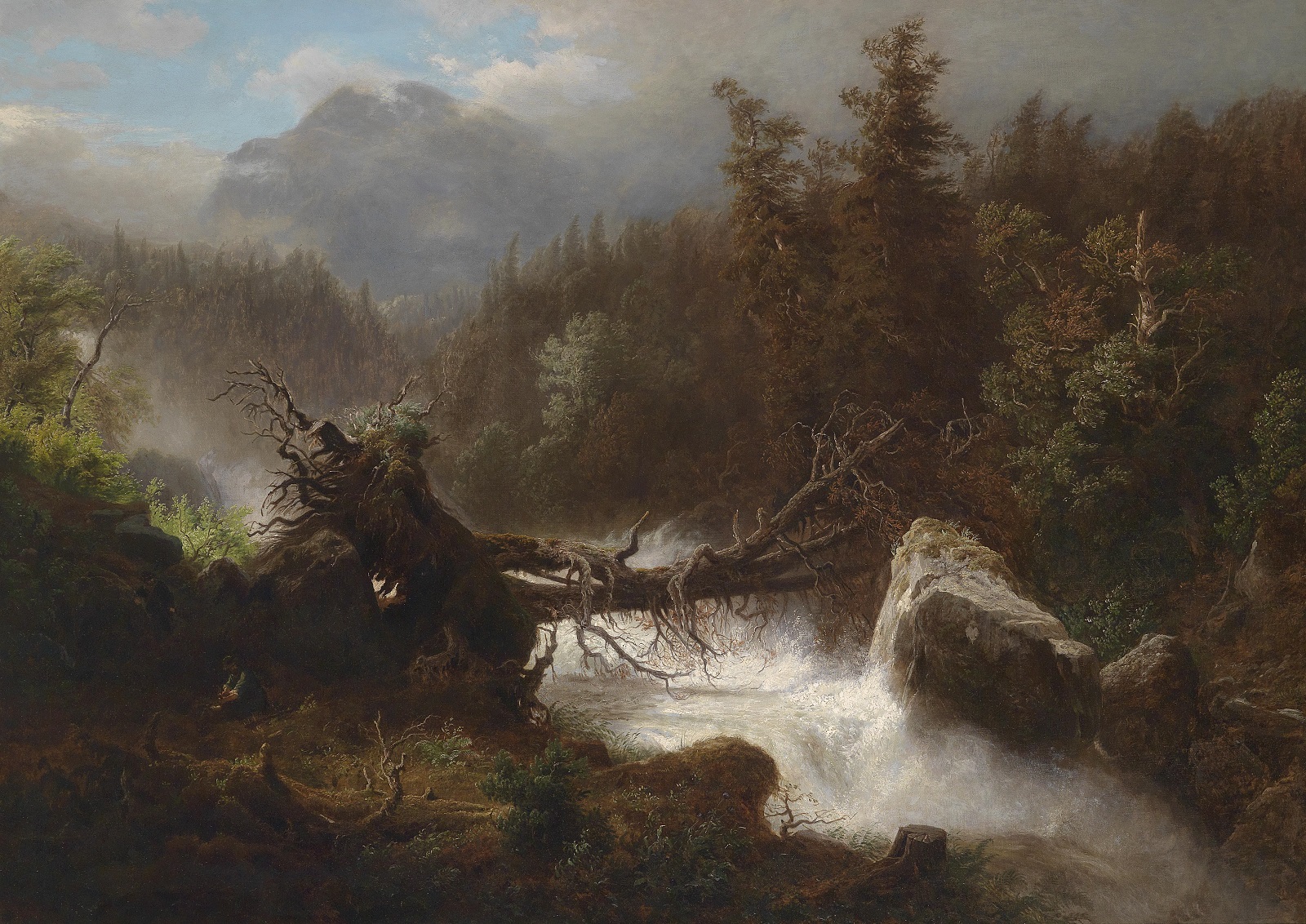
Arnold Schulten -Wasserfall in den Alpen
The rest of the island was too thickly grown with willows to make walking pleasant, but I made the tour, nevertheless. From the lower end the light, of course, changed, and the river looked dark and angry. Only the backs of the flying waves were visible, streaked with foam, and pushed forcibly by the great puffs of wind that fell upon them from behind. For a short mile it was visible, pouring in and out among the islands, and then disappearing with a huge sweep into the willows, which closed about it like a herd of monstrous antediluvian creatures crowding down to drink. They made me think of gigantic sponge-like growths that sucked the river up into themselves. They caused it to vanish from sight. They herded there together in such overpowering numbers.
Altogether it was an impressive scene, with its utter loneliness, its bizarre suggestion; and as I gazed, long and curiously, a singular emotion began to stir somewhere in the depths of me. Midway in my delight of the wild beauty, there crept, unbidden and unexplained, a curious feeling of disquietude, almost of alarm.
A rising river, perhaps, always suggests something of the ominous; many of the little islands I saw before me would probably have been swept away by the morning; this resistless, thundering flood of water touched the sense of awe. Yet I was aware that my uneasiness lay deeper far than the emotions of awe and wonder. It was not that I felt. Nor had it directly to do with the power of the driving wind—this shouting hurricane that might almost carry up a few acres of willows into the air and scatter them like so much chaff over the landscape. The wind was simply enjoying itself, for nothing rose out of the flat landscape to stop it, and I was conscious of sharing its great game with a kind of pleasurable excitement. Yet this novel emotion had nothing to do with the wind. Indeed, so vague was the sense of distress I experienced, that it was impossible to trace it to its source and deal with it accordingly, though I was aware somehow that it had to do with my realization of our utter insignificance before this unrestrained power of the elements about me. The huge-grown river had something to do with it too—a vague, unpleasant idea that we had somehow trifled with these great elemental forces in whose power we lay helpless every hour of the day and night. For here, indeed, they were gigantically at play together, and the sight appealed to the imagination.
But my emotion, so far as I could understand it, seemed to attach itself more particularly to the willow bushes, to these acres and acres of willows, crowding, so thickly growing there, swarming everywhere the eye could reach, pressing upon the river as though to suffocate it, standing in dense array mile after mile beneath the sky, watching, waiting, listening. And, apart quite from the elements, the willows connected themselves subtly with my malaise, attacking the mind insidiously somehow by reason of their vast numbers, and contriving in some way or other to represent to the imagination a new and mighty power, a power, moreover, not altogether friendly to us.
Great revelations of nature, of course, never fail to impress in one way or another, and I was no stranger to moods of the kind. Mountains overawe and oceans terrify, while the mystery of great forests exercises a spell peculiarly its own. But all these, at one point or another, somewhere link on intimately with human life and human experience. They stir comprehensible, even if alarming, emotions. They tend on the whole to exalt.
With this multitude of willows, however, it was something far different, I felt. Some essence emanated from them that besieged the heart. A sense of awe awakened, true, but of awe touched somewhere by a vague terror. Their serried ranks, growing everywhere darker about me as the shadows deepened, moving furiously yet softly in the wind, woke in me the curious and unwelcome suggestion that we had trespassed here upon the borders of an alien world, a world where we were intruders, a world where we were not wanted or invited to remain—where we ran grave risks perhaps!
The feeling, however, though it refused to yield its meaning entirely to analysis, did not at the time trouble me by passing into menace. Yet it never left me quite, even during the very practical business of putting up the tent in a hurricane of wind and building a fire for the stew-pot. It remained, just enough to bother and perplex, and to rob a most delightful camping-ground of a good portion of its charm. To my companion, however, I said nothing, for he was a man I considered devoid of imagination. In the first place, I could never have explained to him what I meant, and in the second, he would have laughed stupidly at me if I had.
There was a slight depression in the center of the island, and here we pitched the tent. The surrounding willows broke the wind a bit.
“A poor camp,” observed the imperturbable Swede when at last the tent stood upright, “no stones and precious little firewood. I’m for moving on early tomorrow—eh? This sand won’t hold anything.”
But the experience of a collapsing tent at midnight had taught us many devices, and we made the cozy gipsy house as safe as possible, and then set about collecting a store of wood to last till bed-time. Willow bushes drop no branches, and driftwood was our only source of supply. We hunted the shores pretty thoroughly. Everywhere the banks were crumbling as the rising flood tore at them and carried away great portions with a splash and a gurgle.
“The island’s much smaller than when we landed,” said the accurate Swede. “It won’t last long at this rate. We’d better drag the canoe close to the tent, and be ready to start at a moment’s notice. I shall sleep in my clothes.”
He was a little distance off, climbing along the bank, and I heard his rather jolly laugh as he spoke.
“By Jove!” I heard him call, a moment later, and turned to see what had caused his exclamation. But for the moment he was hidden by the willows, and I could not find him.
“What in the world’s this?” I heard him cry again, and this time his voice had become serious.
I ran up quickly and joined him on the bank. He was looking over the river, pointing at something in the water.
“Good heavens, it’s a man’s body!” he cried excitedly. “Look!”
A black thing, turning over and over in the foaming waves, swept rapidly past. It kept disappearing and coming up to the surface again. It was about twenty feet from the shore, and just as it was opposite to where we stood it lurched round and looked straight at us. We saw its eyes reflecting the sunset, and gleaming an odd yellow as the body turned over. Then it gave a swift, gulping plunge, and dived out of sight in a flash.
“An otter, by gad!” we exclaimed in the same breath, laughing.It was an otter, alive, and out on the hunt; yet it had looked exactly like the body of a drowned man turning helplessly in the current. Far below it came to the surface once again, and we saw its black skin, wet and shining in the sunlight.
Then, too, just as we turned back, our arms full of driftwood, another thing happened to recall us to the river bank. This time it really was a man, and what was more, a man in a boat. Now a small boat on the Danube was an unusual sight at any time, but here in this deserted region, and at flood time, it was so unexpected as to constitute a real event. We stood and stared.
Whether it was due to the slanting sunlight, or the refraction from the wonderfully illumined water, I cannot say, but, whatever the cause, I found it difficult to focus my sight properly upon the flying apparition. It seemed, however, to be a man standing upright in a sort of flat-bottomed boat, steering with a long oar, and being carried down the opposite shore at a tremendous pace. He apparently was looking across in our direction, but the distance was too great and the light too uncertain for us to make out very plainly what he was about. It seemed to me that he was gesticulating and making signs at us. His voice came across the water to us shouting something furiously, but the wind drowned it so that no single word was audible. There was something curious about the whole appearance—man, boat, signs, voice—that made an impression on me out of all proportion to its cause.
“He’s crossing himself!” I cried. “Look, he’s making the sign of the Cross!”
“I believe you’re right,” the Swede said, shading his eyes with his hand and watching the man out of sight. He seemed to be gone in a moment, melting away down there into the sea of willows where the sun caught them in the bend of the river and turned them into a great crimson wall of beauty. Mist, too, had begun to ruse, so that the air was hazy.
“But what in the world is he doing at nightfall on this flooded river?” I said, half to myself. “Where is he going at such a time, and what did he mean by his signs and shouting? D’you think he wished to warn us about something?”
“He saw our smoke, and thought we were spirits probably,” laughed my companion. “These Hungarians believe in all sorts of rubbish; you remember the shopwoman at Pressburg warning us that no one ever landed here because it belonged to some sort of beings outside man’s world! I suppose they believe in fairies and elementals, possibly demons, too. That peasant in the boat saw people on the islands for the first time in his life,” he added, after a slight pause, “and it scared him, that’s all.”
The Swede’s tone of voice was not convincing, and his manner lacked something that was usually there. I noted the change instantly while he talked, though without being able to label it precisely.
“If they had enough imagination,” I laughed loudly—I remember trying to make as much noise as I could—”they might well people a place like this with the old gods of antiquity. The Romans must have haunted all this region more or less with their shrines and sacred groves and elemental deities.”
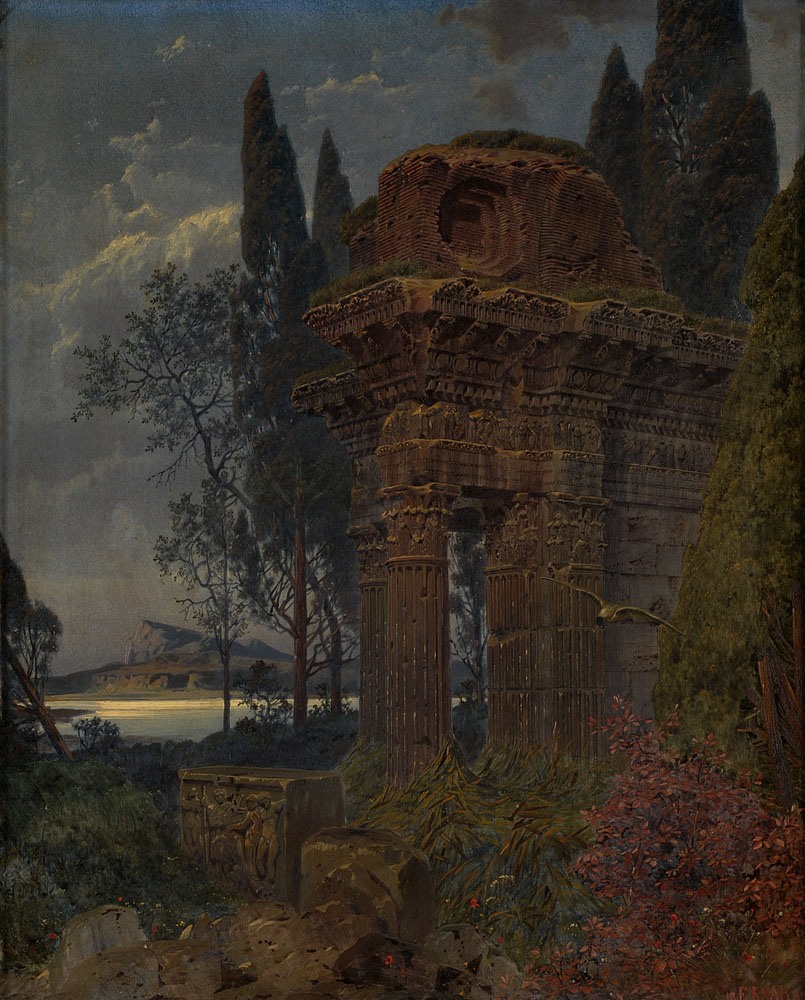
Ferdinand Knab – Ruinenlandschaft 1888
The subject dropped and we returned to our stew-pot, for my friend was not given to imaginative conversation as a rule. Moreover, just then I remember feeling distinctly glad that he was not imaginative; his stolid, practical nature suddenly seemed to me welcome and comforting. It was an admirable temperament, I felt; he could steer down rapids like a red Indian, shoot dangerous bridges and whirlpools better than any white man I ever saw in a canoe. He was a grand fellow for an adventurous trip, a tower of strength when untoward things happened. I looked at his strong face and light curly hair as he staggered along under his pile of driftwood (twice the size of mine!), and I experienced a feeling of relief. Yes, I was distinctly glad just then that the Swede was—what he was, and that he never made remarks that suggested more than they said.
“The river’s still rising, though,” he added, as if following out some thoughts of his own, and dropping his load with a gasp. “This island will be under water in two days if it goes on.”
“I wish the wind would go down,” I said. “I don’t care a fig for the river.”
The flood, indeed, had no terrors for us; we could get off at ten minutes’ notice, and the more water the better we liked it. It meant an increasing current and the obliteration of the treacherous shingle-beds that so often threatened to tear the bottom out of our canoe.
Contrary to our expectations, the wind did not go down with the sun. It seemed to increase with the darkness, howling overhead and shaking the willows round us like straws. Curious sounds accompanied it sometimes, like the explosion of heavy guns, and it fell upon the water and the island in great flat blows of immense power. It made me think of the sounds a planet must make, could we only hear it, driving along through space.
But the sky kept wholly clear of clouds, and soon after supper the full moon rose up in the east and covered the river and the plain of shouting willows with a light like the day.
We lay on the sandy patch beside the fire, smoking, listening to the noises of the night round us, and talking happily of the journey we had already made, and of our plans ahead. The map lay spread in the door of the tent, but the high wind made it hard to study, and presently we lowered the curtain and extinguished the lantern. The firelight was enough to smoke and see each other’s faces by, and the sparks flew about overhead like fireworks. A few yards beyond, the river gurgled and hissed, and from time to time a heavy splash announced the falling away of further portions of the bank.
Our talk, I noticed, had to do with the faraway scenes and incidents of our first camps in the Black Forest, or of other subjects altogether remote from the present setting, for neither of us spoke of the actual moment more than was necessary—almost as though we had agreed tacitly to avoid discussion of the camp and its incidents. Neither the otter nor the boatman, for instance, received the honor of a single mention, though ordinarily these would have furnished discussion for the greater part of the evening. They were, of course, distinct events in such a place.
The scarcity of wood made it a business to keep the fire going, for the wind, that drove the smoke in our faces wherever we sat, helped at the same time to make a forced draught. We took it in turn to make some foraging expeditions into the darkness, and the quantity the Swede brought back always made me feel that he took an absurdly long time finding it; for the fact was I did not care much about being left alone, and yet it always seemed to be my turn to grub about among the bushes or scramble along the slippery banks in the moonlight. The long day’s battle with wind and water—such wind and such water!—had tired us both, and an early bed was the obvious program. Yet neither of us made the move for the tent. We lay there, tending the fire, talking in desultory fashion, peering about us into the dense willow bushes, and listening to the thunder of wind and river. The loneliness of the place had entered our very bones, and silence seemed natural, for after a bit the sound of our voices became a trifle unreal and forced; whispering would have been the fitting mode of communication, I felt, and the human voice, always rather absurd amid the roar of the elements, now carried with it something almost illegitimate. It was like talking out loud in church, or in some place where it was not lawful, perhaps not quite safe, to be overheard.
The eeriness of this lonely island, set among a million willows, swept by a hurricane, and surrounded by hurrying deep waters, touched us both, I fancy. Untrodden by man, almost unknown to man, it lay there beneath the moon, remote from human influence, on the frontier of another world, an alien world, a world tenanted by willows only and the souls of willows. And we, in our rashness, had dared to invade it, even to make use of it! Something more than the power of its mystery stirred in me as I lay on the sand, feet to fire, and peered up through the leaves at the stars. For the last time I rose to get firewood.
“When this has burnt up,” I said firmly, “I shall turn in,” and my companion watched me lazily as I moved off into the surrounding shadows.
For an unimaginative man I thought he seemed unusually receptive that night, unusually open to suggestion of things other than sensory. He too was touched by the beauty and loneliness of the place. I was not altogether pleased, I remember, to recognize this slight change in him, and instead of immediately collecting sticks, I made my way to the far point of the island where the moonlight on plain and river could be seen to better advantage. The desire to be alone had come suddenly upon me; my former dread returned in force; there was a vague feeling in me I wished to face and probe to the bottom.
When I reached the point of sand jutting out among the waves, the spell of the place descended upon me with a positive shock. No mere “scenery” could have produced such an effect. There was something more here, something to alarm.
I gazed across the waste of wild waters; I watched the whispering willows; I heard the ceaseless beating of the tireless wind; and, one and all, each in its own way, stirred in me this sensation of a strange distress. But the willows especially; for ever they went on chattering and talking among themselves, laughing a little, shrilly crying out, sometimes sighing—but what it was they made so much to-do about belonged to the secret life of the great plain they inhabited. And it was utterly alien to the world I knew, or to that of the wild yet kindly elements. They made me think of a host of beings from another plane of life, another evolution altogether, perhaps, all discussing a mystery known only to themselves. I watched them moving busily together, oddly shaking their big bushy heads, twirling their myriad leaves even when there was no wind. They moved of their own will as though alive, and they touched, by some incalculable method, my own keen sense of the horrible.
There they stood in the moonlight, like a vast army surrounding our camp, shaking their innumerable silver spears defiantly, formed all ready for an attack.
The psychology of places, for some imaginations at least, is very vivid; for the wanderer, especially, camps have their “note” either of welcome or rejection. At first it may not always be apparent, because the busy preparations of tent and cooking prevent, but with the first pause—after supper usually—it comes and announces itself. And the note of this willow-camp now became unmistakably plain to me; we were interlopers, trespassers; we were not welcomed. The sense of unfamiliarity grew upon me as I stood there watching. We touched the frontier of a region where our presence was resented. For a night’s lodging we might perhaps be tolerated; but for a prolonged and inquisitive stay—No! by all the gods of the trees and wilderness, no! We were the first human influences upon this island, and we were not wanted. The willows were against us.
Strange thoughts like these, bizarre fancies, borne I know not whence, found lodgment in my mind as I stood listening. What, I thought, if, after all, these crouching willows proved to be alive; if suddenly they should rise up, like a swarm of living creatures, marshaled by the gods whose territory we had invaded, sweep towards us off the vast swamps, booming overhead in the night—and then settle down! As I looked it was so easy to imagine they actually moved, crept nearer, retreated a little, huddled together in masses, hostile, waiting for the great wind that should finally start them a-running. I could have sworn their aspect changed a little, and their ranks deepened and pressed more closely together.
The melancholy shrill cry of a night-bird sounded overhead, and suddenly I nearly lost my balance as the piece of bank I stood upon fell with a great splash into the river, undermined by the flood. I stepped back just in time, and went on hunting for firewood again, half laughing at the odd fancies that crowded so thickly into my mind and cast their spell upon me. I recalled the Swede’s remark about moving on next day, and I was just thinking that I fully agreed with him, when I turned with a start and saw the subject of my thoughts standing immediately in front of me. He was quite close. The roar of the elements had covered his approach.
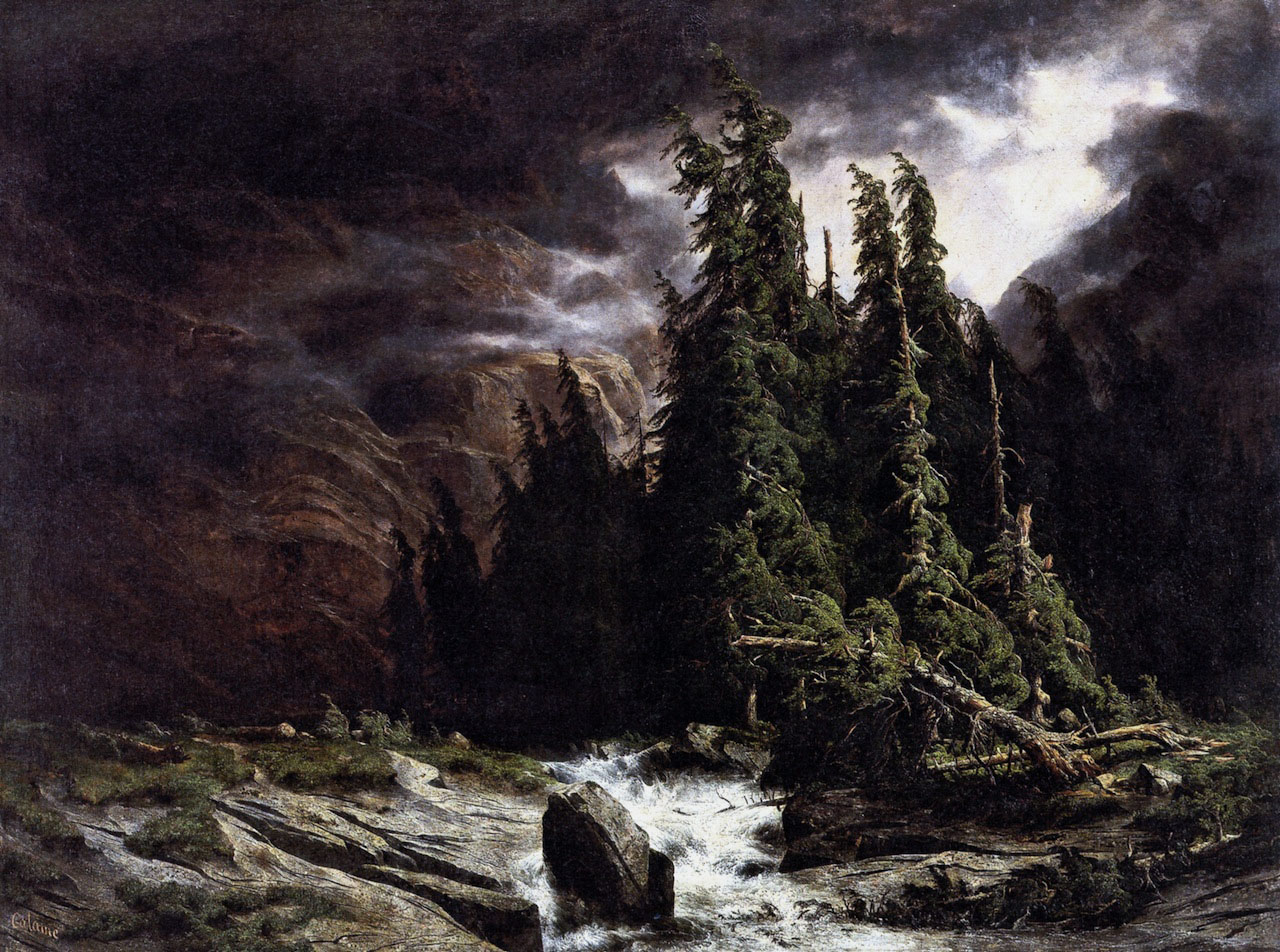
Alexandre Calame – The Thunderstorm at Handeck (1838)
II
“You’ve been gone so long,” he shouted above the wind, “I thought something must have happened to you.”
But there was that in his tone, and a certain look in his face as well, that conveyed to me more than his usual words, and in a flash I understood the real reason for his coming. It was because the spell of the place had entered his soul too, and he did not like being alone.
“River still rising,” he cried, pointing to the flood in the moonlight, “and the wind’s simply awful.”
He always said the same things, but it was the cry for companionship that gave the real importance to his words.
“Lucky,” I cried back, “our tent’s in the hollow. I think it’ll hold all right.” I added something about the difficulty of finding wood, in order to explain my absence, but the wind caught my words and flung them across the river, so that he did not hear, but just looked at me through the branches, nodding his head.
“Lucky if we get away without disaster!” he shouted, or words to that effect; and I remember feeling half angry with him for putting the thought into words, for it was exactly what I felt myself. There was disaster impending somewhere, and the sense of presentiment lay unpleasantly upon me.
We went back to the fire and made a final blaze, poking it up with our feet. We took a last look round. But for the wind the heat would have been unpleasant. I put this thought into words, and I remember my friend’s reply struck me oddly: that he would rather have the heat, the ordinary July weather, than this “diabolical wind.”
Everything was snug for the night; the canoe lying turned over beside the tent, with both yellow paddles beneath her; the provision sack hanging from a willow-stem, and the washed-up dishes removed to a safe distance from the fire, all ready for the morning meal.We smothered the embers of the fire with sand, and then turned in. The flap of the tent door was up, and I saw the branches and the stars and the white moonlight. The shaking willows and the heavy buffetings of the wind against our taut little house were the last things I remembered as sleep came down and covered all with its soft and delicious forgetfulness.
Suddenly I found myself lying awake, peering from my sandy mattress through the door of the tent. I looked at my watch pinned against the canvas, and saw by the bright moonlight that it was past twelve o’clock—the threshold of a new day—and I had therefore slept a couple of hours. The Swede was asleep still beside me; the wind howled as before; something plucked at my heart and made me feel afraid. There was a sense of disturbance in my immediate neighborhood.
I sat up quickly and looked out. The trees were swaying violently to and fro as the gusts smote them, but our little bit of green canvas lay snugly safe in the hollow, for the wind passed over it without meeting enough resistance to make it vicious. The feeling of disquietude did not pass, however, and I crawled quietly out of the tent to see if our belongings were safe. I moved carefully so as not to waken my companion. A curious excitement was on me.
I was half-way out, kneeling on all fours, when my eye first took in that the tops of the bushes opposite, with their moving tracery of leaves, made shapes against the sky. I sat back on my haunches and stared. It was incredible, surely, but there, opposite and slightly above me, were shapes of some indeterminate sort among the willows, and as the branches swayed in the wind they seemed to group themselves about these shapes, forming a series of monstrous outlines that shifted rapidly beneath the moon. Close, about fifty feet in front of me, I saw these things.
My first instinct was to waken my companion, that he too might see them, but something made me hesitate—the sudden realization, probably, that I should not welcome corroboration; and meanwhile I crouched there staring in amazement with smarting eyes. I was wide awake. I remember saying to myself that I was not dreaming.
They first became properly visible, these huge figures, just within the tops of the bushes—immense, bronze-colored, moving, and wholly independent of the swaying of the branches. I saw them plainly and noted, now I came to examine them more calmly, that they were very much larger than human, and indeed that something in their appearance proclaimed them to be not human at all. Certainly they were not merely the moving tracery of the branches against the moonlight. They shifted independently. They rose upwards in a continuous stream from earth to sky, vanishing utterly as soon as they reached the dark of the sky. They were interlaced one with another, making a great column, and I saw their limbs and huge bodies melting in and out of each other, forming this serpentine line that bent and swayed and twisted spirally with the contortions of the wind-tossed trees. They were nude, fluid shapes, passing up the bushes, within the leaves almost—rising up in a living column into the heavens. Their faces I never could see. Unceasingly they poured upwards, swaying in great bending curves, with a hue of dull bronze upon their skins.
I stared, trying to force every atom of vision from my eyes. For a long time I thought they must every moment disappear and resolve themselves into the movements of the branches and prove to be an optical illusion. I searched everywhere for a proof of reality, when all the while I understood quite well that the standard of reality had changed. For the longer I looked the more certain I became that these figures were real and living, though perhaps not according to the standards that the camera and the biologist would insist upon.
Far from feeling fear, I was possessed with a sense of awe and wonder such as I have never known. I seemed to be gazing at the personified elemental forces of this haunted and primeval region. Our intrusion had stirred the powers of the place into activity. It was we who were the cause of the disturbance, and my brain filled to bursting with stories and legends of the spirits and deities of places that have been acknowledged and worshipped by men in all ages of the world’s history. But, before I could arrive at any possible explanation, something impelled me to go farther out, and I crept forward on the sand and stood upright. I felt the ground still warm under my bare feet; the wind tore at my hair and face; and the sound of the river burst upon my ears with a sudden roar. These things, I knew, were real, and proved that my senses were acting normally. Yet the figures still rose from earth to heaven, silent, majestically, in a great spiral of grace and strength that overwhelmed me at length with a genuine deep emotion of worship. I felt that I must fall down and worship—absolutely worship.
Perhaps in another minute I might have done so, when a gust of wind swept against me with such force that it blew me sideways, and I nearly stumbled and fell. It seemed to shake the dream violently out of me. At least it gave me another point of view somehow. The figures still remained, still ascended into heaven from the heart of the night, but myreason at last began to assert itself. It must be a subjective experience, I argued—none the less real for that, but still subjective. The moonlight and the branches combined to work out these pictures upon the mirror of my imagination, and for some reason I projected them outwards and made them appear objective. I knew this must be the case, of course. I took courage, and began to move forward across the open patches of sand. By Jove, though, was it all hallucination? Was it merely subjective? Did not my reason argue in the old futile way from the little standard of the known?
I only know that great column of figures ascended darkly into the sky for what seemed a very long period of time, and with a very complete measure of reality as most men are accustomed to gauge reality. Then suddenly they were gone!
And, once they were gone and the immediate wonder of their great presence had passed, fear came down upon me with a cold rush. The esoteric meaning of this lonely and haunted region suddenly flamed up within me, and I began to tremble dreadfully. I took a quick look round—a look of horror that came near to panic—calculating vainly ways of escape; and then, realizing how helpless I was to achieve anything really effective, I crept back silently into the tent and lay down again upon my sandy mattress, first lowering the door-curtain to shut out the sight of the willows in the moonlight, and then burying my head as deeply as possible beneath the blankets to deaden the sound of the terrifying wind.
As though further to convince me that I had not been dreaming, I remember that it was a long time before I fell again into a troubled and restless sleep; and even then only the upper crust of me slept, and underneath there was something that never quite lost consciousness, but lay alert and on the watch.
But this second time I jumped up with a genuine start of terror. It was neither the wind nor the river that woke me, but the slow approach of something that caused the sleeping portion of me to grow smaller and smaller till at last it vanished altogether, and I found myself sitting bolt upright—listening.
Outside there was a sound of multitudinous little patterings. They had been coming, I was aware, for a long time, and in my sleep they had first become audible. I sat there nervously wide awake as though I had not slept at all. It seemed to me that my breathing came with difficulty, and that there was a great weight upon the surface of my body. In spite of the hot night, I felt clammy with cold and shivered. Something surely was pressing steadily against the sides of the tent and weighing down upon it from above. Was it the body of the wind? Was this the pattering rain, the dripping of the leaves? The spray blown from the river by the wind and gathering in big drops? I thought quickly of a dozen things.
Then suddenly the explanation leaped into my mind: a bough from the poplar, the only large tree on the island, had fallen with the wind. Still half caught by the other branches, it would fall with the next gust and crush us, and meanwhile its leaves brushed and tapped upon the tight canvas surface of the tent. I raised a loose flap and rushed out, calling to the Swede to follow.
But when I got out and stood upright I saw that the tent was free. There was no hanging bough; there was no rain or spray; nothing approached.
A cold, grey light filtered down through the bushes and lay on the faintly gleaming sand. Stars still crowded the sky directly overhead, and the wind howled magnificently, but the fire no longer gave out any glow, and I saw the east reddening in streaks through the trees. Several hours must have passed since I stood there before watching the ascending figures, and the memory of it now came back to me horribly, like an evil dream. Oh, how tired it made me feel, that ceaseless raging wind! Yet, though the deep lassitude of a sleepless night was on me, my nerves were tingling with the activity of an equally tireless apprehension, and all idea of repose was out of the question. The river I saw had risen further. Its thunder filled the air, and a fine spray made itself felt through my thin sleeping shirt.
Yet nowhere did I discover the slightest evidence of anything to cause alarm. This deep, prolonged disturbance in my heart remained wholly unaccounted for.
My companion had not stirred when I called him, and there was no need to waken him now. I looked about me carefully, noting everything; the turned-over canoe; the yellow paddles—two of them, I’m certain; the provision sack and the extra lantern hanging together from the tree; and, crowding everywhere about me, enveloping all, the willows, those endless, shaking willows. A bird uttered its morning cry, and a string of duck passed with whirring flight overhead in the twilight. The sand whirled, dry and stinging, about my bare feet in the wind.
I walked round the tent and then went out a little way into the bush, so that I could see across the river to the farther landscape, and the same profound yet indefinable emotion of distress seized upon me again as I saw the interminable sea of bushes stretching to the horizon, looking ghostly and unreal in the wan light of dawn. I walked softly here and there, still puzzling over that odd sound of infinite pattering, and of that pressure upon the tent that had wakened me. It must have been the wind, I reflected—the wind bearing upon the loose, hot sand, driving the dry particles smartly against the taut canvas—the wind dropping heavily upon our fragile roof.
Yet all the time my nervousness and malaise increased appreciably.
I crossed over to the farther shore and noted how the coast-line had altered in the night, and what masses of sand the river had torn away. I dipped my hands and feet into the cool current, and bathed my forehead. Already there was a glow of sunrise in the sky and the exquisite freshness of coming day. On my way back I passed purposely beneath the very bushes where I had seen the column of figures rising into the air, and midway among the clumps I suddenly found myself overtaken by a sense of vast terror. From the shadows a large figure went swiftly by. Someone passed me, as sure as ever man did….
It was a great staggering blow from the wind that helped me forward again, and once out in the more open space, the sense of terror diminished strangely. The winds were about and walking, I remember saying to myself, for the winds often move like great presences under the trees. And altogether the fear that hovered about me was such an unknown and immense kind of fear, so unlike anything I had ever felt before, that it woke a sense of awe and wonder in me that did much to counteract its worst effects; and when I reached a high point in the middle of the island from which I could see the wide stretch of river, crimson in the sunrise, the whole magical beauty of it all was so overpowering that a sort of wild yearning woke in me and almost brought a cry up into the throat.
But this cry found no expression, for as my eyes wandered from the plain beyond to the island round me and noted our little tent half hidden among the willows, a dreadful discovery leaped out at me, compared to which my terror of the walking winds seemed as nothing at all.
For a change, I thought, had somehow come about in the arrangement of the landscape. It was not that my point of vantage gave me a different view, but that an alteration had apparently been effected in the relation of the tent to the willows, and of the willows to the tent. Surely the bushes now crowded much closer—unnecessarily, unpleasantly close. They had moved nearer.
Creeping with silent feet over the shifting sands, drawing imperceptibly nearer by soft, unhurried movements, the willows had come closer during the night. But had the wind moved them, or had they moved of themselves? I recalled the sound of infinite small patterings and the pressure upon the tent and upon my own heart that caused me to wake in terror. I swayed for a moment in the wind like a tree, finding it hard to keep my upright position on the sandy hillock. There was a suggestion here of personal agency, of deliberate intention, of aggressive hostility, and it terrified me into a sort of rigidity.
Then the reaction followed quickly. The idea was so bizarre, so absurd, that I felt inclined to laugh. But the laughter came no more readily than the cry, for the knowledge that my mind was so receptive to such dangerous imaginings brought the additional terror that it was through our minds and not through our physical bodies that the attack would come, and was coming.
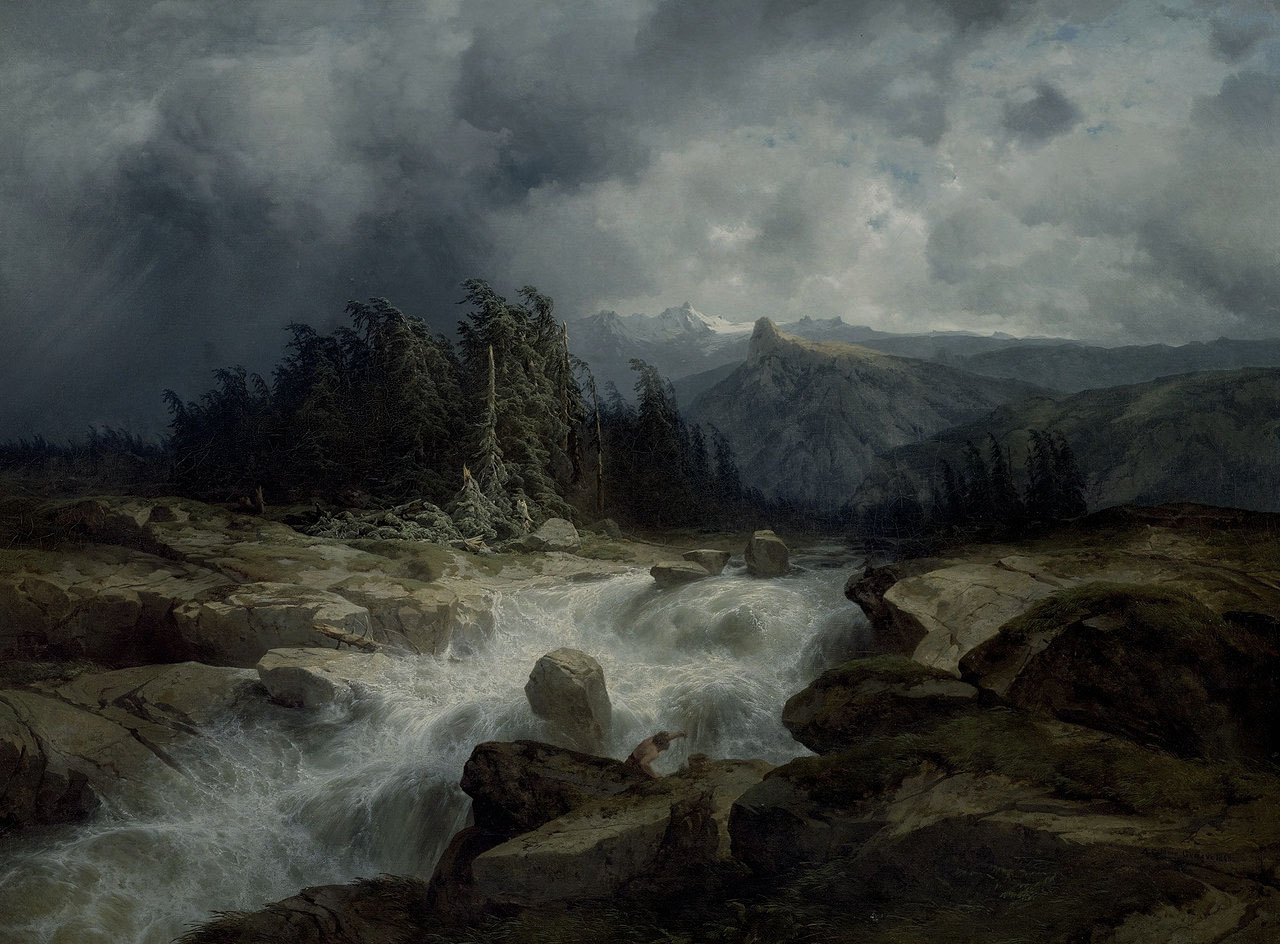
Alexandre Calame – Mountain Torrent Before A Storm (1848)0
The wind buffeted me about, and, very quickly it seemed, the sun came up over the horizon, for it was after four o’clock, and I must have stood on that little pinnacle of sand longer than I knew, afraid to come down to close quarters with the willows. I returned quietly, creepily, to the tent, first taking another exhaustive look round and—yes, I confess it—making a few measurements. I paced out on the warm sand the distances between the willows and the tent, making a note of the shortest distance particularly.
I crawled stealthily into my blankets. My companion, to all appearances, still slept soundly, and I was glad that this was so. Provided my experiences were not corroborated, I could find strength somehow to deny them, perhaps. With the daylight I could persuade myself that it was all a subjective hallucination, a fantasy of the night, a projection of the excited imagination.
Nothing further came in to disturb me, and I fell asleep almost at once, utterly exhausted, yet still in dread of hearing again that weird sound of multitudinous pattering, or of feeling the pressure upon my heart that had made it difficult to breathe.
The sun was high in the heavens when my companion woke me from a heavy sleep and announced that the porridge was cooked and there was just time to bathe. The grateful smell of frizzling bacon entered the tent door.
“River still rising,” he said, “and several islands out in mid-stream have disappeared altogether. Our own island’s much smaller.”
“Any wood left?” I asked sleepily.
“The wood and the island will finish tomorrow in a dead heat,” he laughed, “but there’s enough to last us till then.”
I plunged in from the point of the island, which had indeed altered a lot in size and shape during the night, and was swept down in a moment to the landing-place opposite the tent. The water was icy, and the banks flew by like the country from an express train. Bathing under such conditions was an exhilarating operation, and the terror of the night seemed cleansed out of me by a process of evaporation in the brain. The sun was blazing hot; not a cloud showed itself anywhere; the wind, however, had not abated one little jot.
Quite suddenly then the implied meaning of the Swede’s words flashed across me, showing that he no longer wished to leave post-haste, and had changed his mind. “Enough to last till tomorrow”—he assumed we should stay on the island another night. It struck me as odd. The night before he was so positive the other way. How had the change come about?
Great crumblings of the banks occurred at breakfast, with heavy splashings and clouds of spray which the wind brought into our frying-pan, and my fellow-traveler talked incessantly about the difficulty the Vienna-Pesth steamers must have to find the channel in flood. But the state of his mind interested and impressed me far more than the state of the river or the difficulties of the steamers. He had changed somehow since the evening before. His manner was different—a trifle excited, a trifle shy, with a sort of suspicion about his voice and gestures. I hardly know how to describe it now in cold blood, but at the time I remember being quite certain of one thing—that he had become frightened?
He ate very little breakfast, and for once omitted to smoke his pipe. He had the map spread open beside him, and kept studying its markings.
“We’d better get off sharp in an hour,” I said presently, feeling for an opening that must bring him indirectly to a partial confession at any rate. And his answer puzzled me uncomfortably: “Rather! If they’ll let us.”
“Who’ll let us? The elements?” I asked quickly, with affected indifference.
“The powers of this awful place, whoever they are,” he replied, keeping his eyes on the map. “The gods are here, if they are anywhere at all in the world.”
“The elements are always the true immortals,” I replied, laughing as naturally as I could manage, yet knowing quite well that my face reflected my true feelings when he looked up gravely at me and spoke across the smoke:
“We shall be fortunate if we get away without further disaster.”
This was exactly what I had dreaded, and I screwed myself up to the point of the direct question. It was like agreeing to allow the dentist to extract the tooth; it had to come anyhow in the long run, and the rest was all pretence.
“Further disaster! Why, what’s happened?”
“For one thing—the steering paddle’s gone,” he said quietly.
“The steering paddle gone!” I repeated, greatly excited, for this was our rudder, and the Danube in flood without a rudder was suicide. “But what—”
“And there’s a tear in the bottom of the canoe,” he added, with a genuine little tremor in his voice.
I continued staring at him, able only to repeat the words in his face somewhat foolishly. There, in the heat of the sun, and on this burning sand, I was aware of a freezing atmosphere descending round us. I got up to follow him, for he merely nodded his head gravely and led the way towards the tent a few yards on the other side of the fireplace. The canoe still lay there as I had last seen her in the night, ribs uppermost, the paddles, or rather, the paddle, on the sand beside her.
“There’s only one,” he said, stooping to pick it up. “And here’s the rent in the base-board.”
It was on the tip of my tongue to tell him that I had clearly noticed two paddles a few hours before, but a second impulse made me think better of it, and I said nothing. I approached to see.
There was a long, finely made tear in the bottom of the canoe where a little slither of wood had been neatly taken clean out; it looked as if the tooth of a sharp rock or snag had eaten down her length, and investigation showed that the hole went through. Had we launched out in her without observing it we must inevitably have foundered. At first the water would have made the wood swell so as to close the hole, but once out in mid-stream the water must have poured in, and the canoe, never more than two inches above the surface, would have filled and sunk very rapidly.
“There, you see an attempt to prepare a victim for the sacrifice,” I heard him saying, more to himself than to me, “two victims rather,” he added as he bent over and ran his fingers along the slit.
I began to whistle—a thing I always do unconsciously when utterly nonplussed—and purposely paid no attention to his words. I was determined to consider them foolish.
“It wasn’t there last night,” he said presently, straightening up from his examination and looking anywhere but at me.
“We must have scratched her in landing, of course,” I stopped whistling to say. “The stones are very sharp.”
I stopped abruptly, for at that moment he turned round and met my eye squarely. I knew just as well as he did how impossible my explanation was. There were no stones, to begin with.
“And then there’s this to explain too,” he added quietly, handing me the paddle and pointing to the blade.
A new and curious emotion spread freezingly over me as I took and examined it. The blade was scraped down all over, beautifully scraped, as though someone had sand-papered it with care, making it so thin that the first vigorous stroke must have snapped it off at the elbow.
“One of us walked in his sleep and did this thing,” I said feebly, “or—or it has been filed by the constant stream of sand particles blown against it by the wind, perhaps.”
“Ah,” said the Swede, turning away, laughing a little, “you can explain everything.”
“The same wind that caught the steering paddle and flung it so near the bank that it fell in with the next lump that crumbled,” I called out after him, absolutely determined to find an explanation for everything he showed me.
“I see,” he shouted back, turning his head to look at me before disappearing among the willow bushes.
Once alone with these perplexing evidences of personal agency, I think my first thoughts took the form of “One of us must have done this thing, and it certainly was not I.” But my second thought decided how impossible it was to suppose, under all the circumstances, that either of us had done it. That my companion, the trusted friend of a dozen similar expeditions, could have knowingly had a hand in it, was a suggestion not to be entertained for a moment. Equally absurd seemed the explanation that this imperturbable and densely practical nature had suddenly become insane and was busied with insane purposes.
Yet the fact remained that what disturbed me most, and kept my fear actively alive even in this blaze of sunshine and wild beauty, was the clear certainty that some curious alteration had come about in his mind—that he was nervous, timid, suspicious, aware of goings on he did not speak about, watching a series of secret and hitherto unmentionable events—waiting, in a word, for a climax that he expected, and, I thought, expected very soon. This grew up in my mind intuitively—I hardly knew how.
I made a hurried examination of the tent and its surroundings, but the measurements of the night remained the same. There were deep hollows formed in the sand I now noticed for the first time, basin-shaped and of various depths and sizes, varying from that of a tea-cup to a large bowl. The wind, no doubt, was responsible for these miniature craters, just as it was for lifting the paddle and tossing it towards the water. The rent in the canoe was the only thing that seemed quite inexplicable; and, after all, it was conceivable that a sharp point had caught it when we landed. The examination I made of the shore did not assist this theory, but all the same I clung to it with that diminishing portion of my intelligence which I called my “reason.” An explanation of some kind was an absolute necessity, just as some working explanation of the universe is necessary—however absurd—to the happiness of every individual who seeks to do his duty in the world and face the problems of life. The simile seemed to me at the time an exact parallel.
I at once set the pitch melting, and presently the Swede joined me at the work, though under the best conditions in the world the canoe could not be safe for traveling till the following day. I drew his attention casually to the hollows in the sand.
“Yes,” he said, “I know. They’re all over the island. But you can explain them, no doubt!”
“Wind, of course,” I answered without hesitation. “Have you never watched those little whirlwinds in the street that twist and twirl everything into a circle? This sand’s loose enough to yield, that’s all.”
He made no reply, and we worked on in silence for a bit. I watched him surreptitiously all the time, and I had an idea he was watching me. He seemed, too, to be always listening attentively to something I could not hear, or perhaps for something that he expected to hear, for he kept turning about and staring into the bushes, and up into the sky, and out across the water where it was visible through the openings among the willows. Sometimes he even put his hand to his ear and held it there for several minutes. He said nothing to me, however, about it, and I asked no questions. And meanwhile, as he mended that torn canoe with the skill and address of a red Indian, I was glad to notice his absorption in the work, for there was a vague dread in my heart that he would speak of the changed aspect of the willows. And, if he had noticed that, my imagination could no longer be held a sufficient explanation of it.
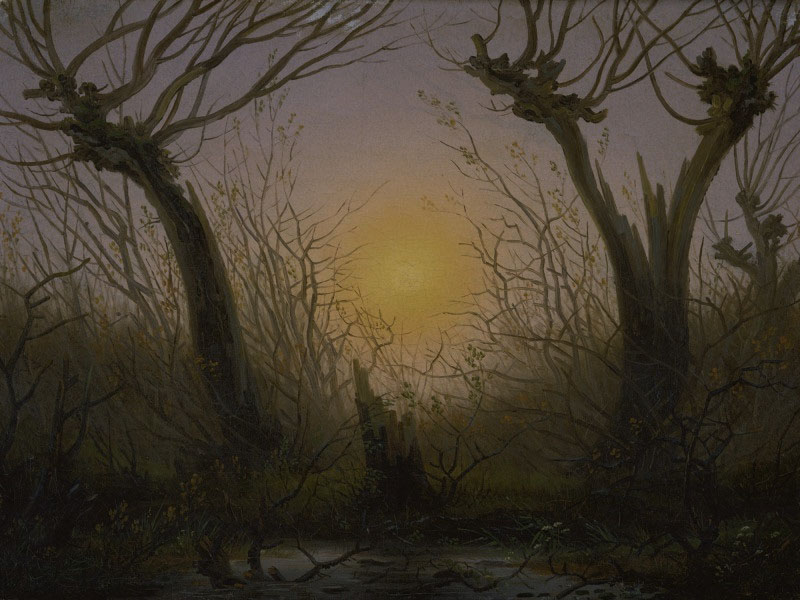
Caspar David Friedrich – Willow Bush under a Setting Sun (ca.1832-35)
III
At length, after a long pause, he began to talk.
“Queer thing,” he added in a hurried sort of voice, as though he wanted to say something and get it over. “Queer thing. I mean, about that otter last night.”
I had expected something so totally different that he caught me with surprise, and I looked up sharply.
“Shows how lonely this place is. Otters are awfully shy things—”
“I don’t mean that, of course,” he interrupted. “I mean—do you think—did you think it really was an otter?”
“What else, in the name of Heaven, what else?”
“You know, I saw it before you did, and at first it seemed—so much bigger than an otter.”
“The sunset as you looked up-stream magnified it, or something,” I replied.
He looked at me absently a moment, as though his mind were busy with other thoughts.
“It had such extraordinary yellow eyes,” he went on half to himself.
“That was the sun too,” I laughed, a trifle boisterously. “I suppose you’ll wonder next if that fellow in the boat—”
I suddenly decided not to finish the sentence. He was in the act again of listening, turning his head to the wind, and something in the expression of his face made me halt. The subject dropped, and we went on with our caulking. Apparently he had not noticed my unfinished sentence. Five minutes later, however, he looked at me across the canoe, the smoking pitch in his hand, his face exceedingly grave.
“I did rather wonder, if you want to know,” he said slowly, “what that thing in the boat was. I remember thinking at the time it was not a man. The whole business seemed to rise quite suddenly out of the water.”
I laughed again boisterously in his face, but this time there was impatience, and a strain of anger too, in my feeling.
“Look here now,” I cried, “this place is quite queer enough without going out of our way to imagine things! That boat was an ordinary boat, and the man in it was an ordinary man, and they were both going down-stream as fast as they could lick. And that otter was an otter, so don’t let’s play the fool about it!”
He looked steadily at me with the same grave expression. He was not in the least annoyed. I took courage from his silence.
“And, for Heaven’s sake,” I went on, “don’t keep pretending you hear things, because it only gives me the jumps, and there’s nothing to hear but the river and this cursed old thundering wind.”
“You fool!” he answered in a low, shocked voice, “you utter fool. That’s just the way all victims talk. As if you didn’t understand just as well as I do!” he sneered with scorn in his voice, and a sort of resignation. “The best thing you can do is to keep quiet and try to hold your mind as firm as possible. This feeble attempt at self-deception only makes the truth harder when you’re forced to meet it.”
My little effort was over, and I found nothing more to say, for I knew quite well his words were true, and that I was the fool, not he. Up to a certain stage in the adventure he kept ahead of me easily, and I think I felt annoyed to be out of it, to be thus proved less psychic, less sensitive than himself to these extraordinary happenings, and half ignorant all the time of what was going on under my very nose. He knew from the very beginning, apparently. But at the moment I wholly missed the point of his words about the necessity of there being a victim, and that we ourselves were destined to satisfy the want. I dropped all pretence thenceforward, but thenceforward likewise my fear increased steadily to the climax.
“But you’re quite right about one thing,” he added, before the subject passed, “and that is that we’re wiser not to talk about it, or even to think about it, because what one thinks finds expression in words, and what one says, happens.”
That afternoon, while the canoe dried and hardened, we spent trying to fish, testing the leak, collecting wood, and watching the enormous flood of rising water. Masses of driftwood swept near our shores sometimes, and we fished for them with long willow branches. The island grew perceptibly smaller as the banks were torn away with great gulps and splashes. The weather kept brilliantly fine till about four o’clock, and then for the first time for three days the wind showed signs of abating. Clouds began to gather in the south-west, spreading thence slowly over the sky.
This lessening of the wind came as a great relief, for the incessant roaring, banging, and thundering had irritated our nerves. Yet the silence that came about five o’clock with its sudden cessation was in a manner quite as oppressive. The booming of the river had everything in its own way then; it filled the air with deep murmurs, more musical than the wind noises, but infinitely more monotonous. The wind held many notes, rising, falling always beating out some sort of great elemental tune; whereas the river’s song lay between three notes at most—dull pedal notes, that held a lugubrious quality foreign to the wind, and somehow seemed to me, in my then nervous state, to sound wonderfully well the music of doom.
“The wind held many notes, rising, falling always beating out some sort of great elemental tune; whereas the river’s song lay between three notes at most—dull pedal notes, that held a lugubrious quality foreign to the wind, and somehow seemed to me, in my then nervous state, to sound wonderfully well the music of doom.”
It was extraordinary, too, how the withdrawal suddenly of bright sunlight took everything out of the landscape that made for cheerfulness; and since this particular landscape had already managed to convey the suggestion of something sinister, the change of course was all the more unwelcome and noticeable. For me, I know, the darkening outlook became distinctly more alarming, and I found myself more than once calculating how soon after sunset the full moon would get up in the east, and whether the gathering clouds would greatly interfere with her lighting of the little island.
With this general hush of the wind—though it still indulged in occasional brief gusts—the river seemed to me to grow blacker, the willows to stand more densely together. The latter, too, kept up a sort of independent movement of their own, rustling among themselves when no wind stirred, and shaking oddly from the roots upwards. When common objects in this way become charged with the suggestion of horror, they stimulate the imagination far more than things of unusual appearance; and these bushes, crowding huddled about us, assumed for me in the darkness a bizarre grotesquerie of appearance that lent to them somehow the aspect of purposeful and living creatures. Their very ordinariness, I felt, masked what was malignant and hostile to us. The forces of the region drew nearer with the coming of night. They were focusing upon our island, and more particularly upon ourselves. For thus, somehow, in the terms of the imagination, did my really indescribable sensations in this extraordinary place present themselves.
I had slept a good deal in the early afternoon, and had thus recovered somewhat from the exhaustion of a disturbed night, but this only served apparently to render me more susceptible than before to the obsessing spell of the haunting. I fought against it, laughing at my feelings as absurd and childish, with very obvious physiological explanations, yet, in spite of every effort, they gained in strength upon me so that I dreaded the night as a child lost in a forest must dread the approach of darkness.
The canoe we had carefully covered with a waterproof sheet during the day, and the one remaining paddle had been securely tied by the Swede to the base of a tree, lest the wind should rob us of that too. From five o’clock onwards I busied myself with the stew-pot and preparations for dinner, it being my turn to cook that night. We had potatoes, onions, bits of bacon fat to add flavor, and a general thick residue from former stews at the bottom of the pot; with black bread broken up into it the result was most excellent, and it was followed by a stew of plums with sugar and a brew of strong tea with dried milk. A good pile of wood lay close at hand, and the absence of wind made my duties easy. My companion sat lazily watching me, dividing his attentions between cleaning his pipe and giving useless advice—an admitted privilege of the off-duty man. He had been very quiet all the afternoon, engaged in re-caulking the canoe, strengthening the tent ropes, and fishing for driftwood while I slept. No more talk about undesirable things had passed between us, and I think his only remarks had to do with the gradual destruction of the island, which he declared was not fully a third smaller than when we first landed.
The pot had just begun to bubble when I heard his voice calling to me from the bank, where he had wandered away without my noticing. I ran up.
“Come and listen,” he said, “and see what you make of it.” He held his hand cupwise to his ear, as so often before.
“Now do you hear anything?” he asked, watching me curiously.
We stood there, listening attentively together. At first I heard only the deep note of the water and the hissings rising from its turbulent surface. The willows, for once, were motionless and silent. Then a sound began to reach my ears faintly, a peculiar sound—something like the humming of a distant gong. It seemed to come across to us in the darkness from the waste of swamps and willows opposite. It was repeated at regular intervals, but it was certainly neither the sound of a bell nor the hooting of a distant steamer. I can liken it to nothing so much as to the sound of an immense gong, suspended far up in the sky, repeating incessantly its muffled metallic note, soft and musical, as it was repeatedly struck. My heart quickened as I listened.
“I’ve heard it all day,” said my companion. “While you slept this afternoon it came all round the island. I hunted it down, but could never get near enough to see—to localize it correctly. Sometimes it was overhead, and sometimes it seemed under the water. Once or twice, too, I could have sworn it was not outside at all, but within myself—you know—the way a sound in the fourth dimension is supposed to come.”
I was too much puzzled to pay much attention to his words. I listened carefully, striving to associate it with any known familiar sound I could think of, but without success. It changed in the direction, too, coming nearer, and then sinking utterly away into remote distance. I cannot say that it was ominous in quality, because to me it seemed distinctly musical, yet I must admit it set going a distressing feeling that made me wish I had never heard it.
“The wind blowing in those sand-funnels,” I said determined to find an explanation, “or the bushes rubbing together after the storm perhaps.”
“It comes off the whole swamp,” my friend answered. “It comes from everywhere at once.” He ignored my explanations. “It comes from the willow bushes somehow—”
“But now the wind has dropped,” I objected. “The willows can hardly make a noise by themselves, can they?”
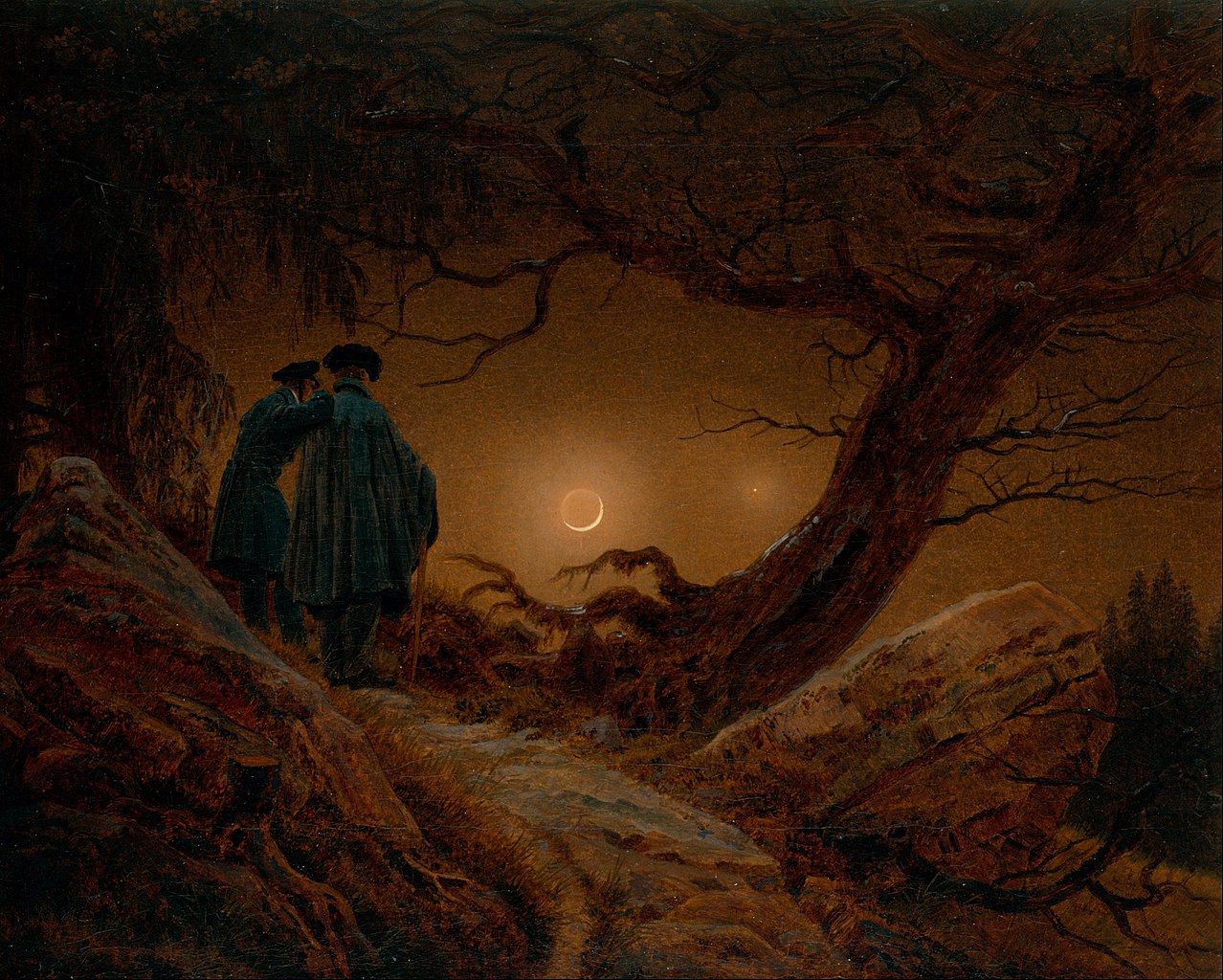
Caspar David Friedrich – Two Men Contemplating the Moon (1819/20)
His answer frightened me, first because I had dreaded it, and secondly, because I knew intuitively it was true.
“It is because the wind has dropped we now hear it. It was drowned before.
It is the cry, I believe, of the—”
I dashed back to my fire, warned by the sound of bubbling that the stew was in danger, but determined at the same time to escape further conversation. I was resolute, if possible, to avoid the exchanging of views. I dreaded, too, that he would begin about the gods, or the elemental forces, or something else disquieting, and I wanted to keep myself well in hand for what might happen later. There was another night to be faced before we escaped from this distressing place, and there was no knowing yet what it might bring forth.
“Come and cut up bread for the pot,” I called to him, vigorously stirring the appetizing mixture. That stew-pot held sanity for us both, and the thought made me laugh.
He came over slowly and took the provision sack from the tree, fumbling in its mysterious depths, and then emptying the entire contents upon the ground-sheet at his feet.
“Hurry up!” I cried; “it’s boiling.”
The Swede burst out into a roar of laughter that startled me. It was forced laughter, not artificial exactly, but mirthless.
“There’s nothing here!” he shouted, holding his sides.
“Bread, I mean.”
“It’s gone. There is no bread. They’ve taken it!”
I dropped the long spoon and ran up. Everything the sack had contained lay upon the ground-sheet, but there was no loaf.
The whole dead weight of my growing fear fell upon me and shook me. Then I burst out laughing too. It was the only thing to do: and the sound of my laughter also made me understand his. The stain of psychical pressure caused it—this explosion of unnatural laughter in both of us; it was an effort of repressed forces to seek relief; it was a temporary safety-valve. And with both of us it ceased quite suddenly.
“How criminally stupid of me!” I cried, still determined to be consistent and find an explanation. “I clean forgot to buy a loaf at Pressburg. That chattering woman put everything out of my head, and I must have left it lying on the counter or—”
“The oatmeal, too, is much less than it was this morning,” the Swede interrupted.
Why in the world need he draw attention to it? I thought angrily.
“There’s enough for tomorrow,” I said, stirring vigorously, “and we can get lots more at Komorn or Gran. In twenty-four hours we shall be miles from here.”
“I hope so—to God,” he muttered, putting the things back into the sack, “unless we’re claimed first as victims for the sacrifice,” he added with a foolish laugh. He dragged the sack into the tent, for safety’s sake, I suppose, and I heard him mumbling to himself, but so indistinctly that it seemed quite natural for me to ignore his words.
Our meal was beyond question a gloomy one, and we ate it almost in silence, avoiding one another’s eyes, and keeping the fire bright. Then we washed up and prepared for the night, and, once smoking, our minds unoccupied with any definite duties, the apprehension I had felt all day long became more and more acute. It was not then active fear, I think, but the very vagueness of its origin distressed me far more than if I had been able to ticket and face it squarely. The curious sound I have likened to the note of a gong became now almost incessant, and filled the stillness of the night with a faint, continuous ringing rather than a series of distinct notes. At one time it was behind and at another time in front of us. Sometimes I fancied it came from the bushes on our left, and then again from the clumps on our right. More often it hovered directly overhead like the whirring of wings. It was really everywhere at once, behind, in front, at our sides and over our heads, completely surrounding us. The sound really defies description. But nothing within my knowledge is like that ceaseless muffled humming rising off the deserted world of swamps and willows.
We sat smoking in comparative silence, the strain growing every minute greater. The worst feature of the situation seemed to me that we did not know what to expect, and could therefore make no sort of preparation by way of defense. We could anticipate nothing. My explanations made in the sunshine, moreover, now came to haunt me with their foolish and wholly unsatisfactory nature, and it was more and more clear to us that some kind of plain talk with my companion was inevitable, whether I liked it or not. After all, we had to spend the night together, and to sleep in the same tent side by side. I saw that I could not get along much longer without the support of his mind, and for that, of course, plain talk was imperative. As long as possible, however, I postponed this little climax, and tried to ignore or laugh at the occasional sentences he flung into the emptiness.
Some of these sentences, moreover, were confoundedly disquieting to me, coming as they did to corroborate much that I felt myself; corroboration, too—which made it so much more convincing—from a totally different point of view. He composed such curious sentences, and hurled them at me in such an inconsequential sort of way, as though his main line of thought was secret to himself, and these fragments were mere bits he found it impossible to digest. He got rid of them by uttering them. Speech relieved him. It was like being sick.
“There are things about us, I’m sure, that make for disorder, disintegration, destruction, our destruction,” he said once, while the fire blazed between us. “We’ve strayed out of a safe line somewhere.”
And, another time, when the gong sounds had come nearer, ringing much louder than before, and directly over our heads, he said as though talking to himself:
“I don’t think a gramophone would show any record of that. The sound doesn’t come to me by the ears at all. The vibrations reach me in another manner altogether, and seem to be within me, which is precisely how a fourth dimensional sound might be supposed to make itself heard.”
I purposely made no reply to this, but I sat up a little closer to the fire and peered about me into the darkness. The clouds were massed all over the sky, and no trace of moonlight came through. Very still, too, everything was, so that the river and the frogs had things all their own way.
“It has that about it,” he went on, “which is utterly out of common experience. It is unknown. Only one thing describes it really; it is a non-human sound; I mean a sound outside humanity.”
Having rid himself of this indigestible morsel, he lay quiet for a time, but he had so admirably expressed my own feeling that it was a relief to have the thought out, and to have confined it by the limitation of words from dangerous wandering to and fro in the mind.
The solitude of that Danube camping-place, can I ever forget it? The feeling of being utterly alone on an empty planet! My thoughts ran incessantly upon cities and the haunts of men. I would have given my soul, as the saying is, for the “feel” of those Bavarian villages we had passed through by the score; for the normal, human commonplaces; peasants drinking beer, tables beneath the trees, hot sunshine, and a ruined castle on the rocks behind the red-roofed church. Even the tourists would have been welcome.
Yet what I felt of dread was no ordinary ghostly fear. It was infinitely greater, stranger, and seemed to arise from some dim ancestral sense of terror more profoundly disturbing than anything I had known or dreamed of. We had “strayed,” as the Swede put it, into some region or some set of conditions where the risks were great, yet unintelligible to us; where the frontiers of some unknown world lay close about us. It was a spot held by the dwellers in some outer space, a sort of peep-hole whence they could spy upon the earth, themselves unseen, a point where the veil between had worn a little thin. As the final result of too long a sojourn here, we should be carried over the border and deprived of what we called “our lives,” yet by mental, not physical, processes. In that sense, as he said, we should be the victims of our adventure—a sacrifice.
It took us in different fashion, each according to the measure of his sensitiveness and powers of resistance. I translated it vaguely into a personification of the mightily disturbed elements, investing them with the horror of a deliberate and malefic purpose, resentful of our audacious intrusion into their breeding-place; whereas my friend threw it into the unoriginal form at first of a trespass on some ancient shrine, some place where the old gods still held sway, where the emotional forces of former worshippers still clung, and the ancestral portion of him yielded to the old pagan spell.
At any rate, here was a place unpolluted by men, kept clean by the winds from coarsening human influences, a place where spiritual agencies were within reach and aggressive. Never, before or since, have I been so attacked by indescribable suggestions of a “beyond region,” of another scheme of life, another revolution not parallel to the human. And in the end our minds would succumb under the weight of the awful spell, and we should be drawn across the frontier into their world.
Small things testified to the amazing influence of the place, and now in the silence round the fire they allowed themselves to be noted by the mind. The very atmosphere had proved itself a magnifying medium to distort every indication: the otter rolling in the current, the hurrying boatman making signs, the shifting willows, one and all had been robbed of its natural character, and revealed in something of its other aspect—as it existed across the border to that other region. And this changed aspect I felt was now not merely to me, but to the race. The whole experience whose verge we touched was unknown to humanity at all. It was a new order of experience, and in the true sense of the word unearthly.
“It’s the deliberate, calculating purpose that reduces one’s courage to zero,” the Swede said suddenly, as if he had been actually following my thoughts. “Otherwise imagination might count for much. But the paddle, the canoe, the lessening food—”
“Haven’t I explained all that once?” I interrupted viciously.
“You have,” he answered dryly; “you have indeed.”
He made other remarks too, as usual, about what he called the “plain determination to provide a victim”; but, having now arranged my thoughts better, I recognized that this was simply the cry of his frightened soul against the knowledge that he was being attacked in a vital part, and that he would be somehow taken or destroyed. The situation called for a courage and calmness of reasoning that neither of us could compass, and I have never before been so clearly conscious of two persons in me—the one that explained everything, and the other that laughed at such foolish explanations, yet was horribly afraid.
Meanwhile, in the pitchy night the fire died down and the wood pile grew small. Neither of us moved to replenish the stock, and the darkness consequently came up very close to our faces. A few feet beyond the circle of firelight it was inky black. Occasionally a stray puff of wind set the willows shivering about us, but apart from this not very welcome sound a deep and depressing silence reigned, broken only by the gurgling of the river and the humming in the air overhead.
We both missed, I think, the shouting company of the winds.
At length, at a moment when a stray puff prolonged itself as though the wind were about to rise again, I reached the point for me of saturation, the point where it was absolutely necessary to find relief in plain speech, or else to betray myself by some hysterical extravagance that must have been far worse in its effect upon both of us. I kicked the fire into a blaze, and turned to my companion abruptly. He looked up with a start.
“I can’t disguise it any longer,” I said; “I don’t like this place, and the darkness, and the noises, and the awful feelings I get. There’s something here that beats me utterly. I’m in a blue funk, and that’s the plain truth. If the other shore was—different, I swear I’d be inclined to swim for it!”
The Swede’s face turned very white beneath the deep tan of sun and wind. He stared straight at me and answered quietly, but his voice betrayed his huge excitement by its unnatural calmness. For the moment, at any rate, he was the strong man of the two. He was more phlegmatic, for one thing.
“It’s not a physical condition we can escape from by running away,” he replied, in the tone of a doctor diagnosing some grave disease; “we must sit tight and wait. There are forces close here that could kill a herd of elephants in a second as easily as you or I could squash a fly. Our only chance is to keep perfectly still. Our insignificance perhaps may save us.”
I put a dozen questions into my expression of face, but found no words. It was precisely like listening to an accurate description of a disease whose symptoms had puzzled me.
“I mean that so far, although aware of our disturbing presence, they have not found us—not ‘located’ us, as the Americans say,” he went on. “They’re blundering about like men hunting for a leak of gas. The paddle and canoe and provisions prove that. I think they feel us, but cannot actually see us. We must keep our minds quiet—it’s our minds they feel. We must control our thoughts, or it’s all up with us.”
“Death, you mean?” I stammered, icy with the horror of his suggestion.
“Worse—by far,” he said. “Death, according to one’s belief, means either annihilation or release from the limitations of the senses, but it involves no change of character. You don’t suddenly alter just because the body’s gone. But this means a radical alteration, a complete change, a horrible loss of oneself by substitution—far worse than death, and not even annihilation. We happen to have camped in a spot where their region touches ours, where the veil between has worn thin”—horrors! he was using my very own phrase, my actual words—”so that they are aware of our being in their neighborhood.”
“But who are aware?” I asked.
I forgot the shaking of the willows in the windless calm, the humming overhead, everything except that I was waiting for an answer that I dreaded more than I can possibly explain.
He lowered his voice at once to reply, leaning forward a little over the fire, an indefinable change in his face that made me avoid his eyes and look down upon the ground.
“All my life,” he said, “I have been strangely, vividly conscious of another region—not far removed from our own world in one sense, yet wholly different in kind—where great things go on unceasingly, where immense and terrible personalities hurry by, intent on vast purposes compared to which earthly affairs, the rise and fall of nations, the destinies of empires, the fate of armies and continents, are all as dust in the balance; vast purposes, I mean, that deal directly with the soul, and not indirectly with more expressions of the soul—”
“I suggest just now—” I began, seeking to stop him, feeling as though I was face to face with a madman. But he instantly overbore me with his torrent that had to come.
“You think,” he said, “it is the spirit of the elements, and I thought perhaps it was the old gods. But I tell you now it is—neither. These would be comprehensible entities, for they have relations with men, depending upon them for worship or sacrifice, whereas these beings who are now about us have absolutely nothing to do with mankind, and it is mere chance that their space happens just at this spot to touch our own.”
The mere conception, which his words somehow made so convincing, as I listened to them there in the dark stillness of that lonely island, set me shaking a little all over. I found it impossible to control my movements.
“And what do you propose?” I began again.
“A sacrifice, a victim, might save us by distracting them until we could get away,” he went on, “just as the wolves stop to devour the dogs and give the sleigh another start. But—I see no chance of any other victim now.”
I stared blankly at him. The gleam in his eye was dreadful. Presently he continued.
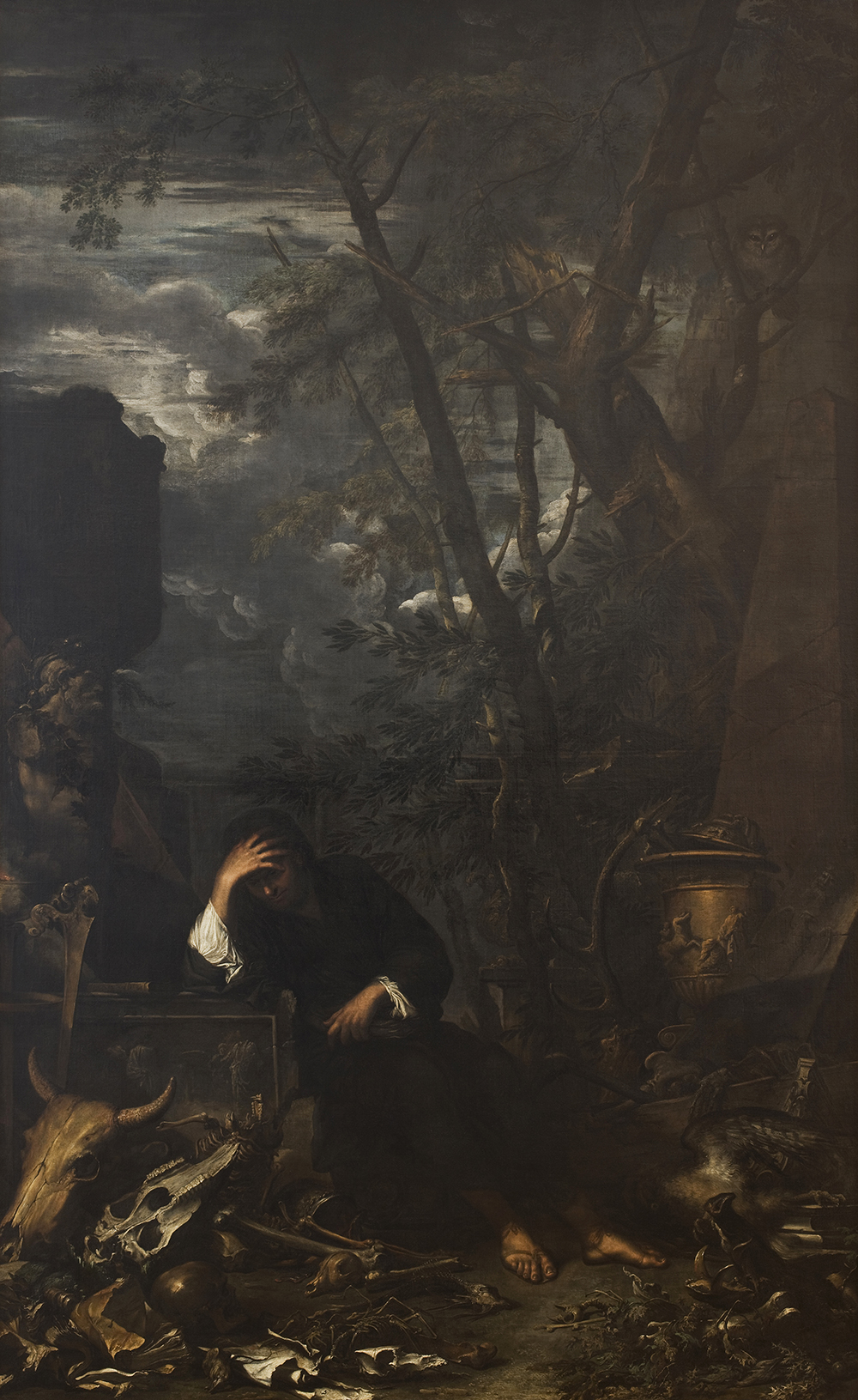
Salvator Rosa – Demokritus in Meditation (1650-51)
IV
“It’s the willows, of course. The willows mask the others, but the others are feeling about for us. If we let our minds betray our fear, we’re lost, lost utterly.” He looked at me with an expression so calm, so determined, so sincere, that I no longer had any doubts as to his sanity. He was as sane as any man ever was. “If we can hold out through the night,” he added, “we may get off in the daylight unnoticed, or rather, undiscovered.”
“But you really think a sacrifice would—”
That gong-like humming came down very close over our heads as I spoke, but it was my friend’s scared face that really stopped my mouth.
“Hush!” he whispered, holding up his hand. “Do not mention them more than you can help. Do not refer to them by name. To name is to reveal; it is the inevitable clue, and our only hope lies in ignoring them, in order that they may ignore us.”
“Even in thought?” He was extraordinarily agitated.
“Especially in thought. Our thoughts make spirals in their world. We must keep them out of our minds at all costs if possible.”
I raked the fire together to prevent the darkness having everything its own way. I never longed for the sun as I longed for it then in the awful blackness of that summer night.
“Were you awake all last night?” he went on suddenly.
“I slept badly a little after dawn,” I replied evasively, trying to follow his instructions, which I knew instinctively were true, “but the wind, of course—”
“I know. But the wind won’t account for all the noises.”
“Then you heard it too?”
“The multiplying countless little footsteps I heard,” he said, adding, after a moment’s hesitation, “and that other sound—”
“You mean above the tent, and the pressing down upon us of something tremendous, gigantic?”
He nodded significantly.
“It was like the beginning of a sort of inner suffocation?” I said.
“Partly, yes. It seemed to me that the weight of the atmosphere had been altered—had increased enormously, so that we should have been crushed.”
“And that,” I went on, determined to have it all out, pointing upwards where the gong-like note hummed ceaselessly, rising and falling like wind. “What do you make of that?”
“It’s their sound,” he whispered gravely. “It’s the sound of their world, the humming in their region. The division here is so thin that it leaks through somehow. But, if you listen carefully, you’ll find it’s not above so much as around us. It’s in the willows. It’s the willows themselves humming, because here the willows have been made symbols of the forces that are against us.”
I could not follow exactly what he meant by this, yet the thought and idea in my mind were beyond question the thought and idea in his. I realized what he realized, only with less power of analysis than his. It was on the tip of my tongue to tell him at last about my hallucination of the ascending figures and the moving bushes, when he suddenly thrust his face again close into mine across the firelight and began to speak in a very earnest whisper. He amazed me by his calmness and pluck, his apparent control of the situation. This man I had for years deemed unimaginative, stolid!
“Now listen,” he said. “The only thing for us to do is to go on as though nothing had happened, follow our usual habits, go to bed, and so forth; pretend we feel nothing and notice nothing. It is a question wholly of the mind, and the less we think about them the better our chance of escape. Above all, don’t think, for what you think happens!”
“All right,” I managed to reply, simply breathless with his words and the strangeness of it all; “all right, I’ll try, but tell me one more thing first. Tell me what you make of those hollows in the ground all about us, those sand-funnels?”
“No!” he cried, forgetting to whisper in his excitement. “I dare not, simply dare not, put the thought into words. If you have not guessed I am glad. Don’t try to. They have put it into my mind; try your hardest to prevent their putting it into yours.”
He sank his voice again to a whisper before he finished, and I did not press him to explain. There was already just about as much horror in me as I could hold. The conversation came to an end, and we smoked our pipes busily in silence.
Then something happened, something unimportant apparently, as the way is when the nerves are in a very great state of tension, and this small thing for a brief space gave me an entirely different point of view. I chanced to look down at my sand-shoe—the sort we used for the canoe—and something to do with the hole at the toe suddenly recalled to me the London shop where I had bought them, the difficulty the man had in fitting me, and other details of the uninteresting but practical operation. At once, in its train, followed a wholesome view of the modern skeptical world I was accustomed to move in at home. I thought of roast beef, and ale, motor-cars, policemen, brass bands, and a dozen other things that proclaimed the soul of ordinariness or utility. The effect was immediate and astonishing even to myself. Psychologically, I suppose, it was simply a sudden and violent reaction after the strain of living in an atmosphere of things that to the normal consciousness must seem impossible and incredible. But, whatever the cause, it momentarily lifted the spell from my heart, and left me for the short space of a minute feeling free and utterly unafraid. I looked up at my friend opposite.
“You damned old pagan!” I cried, laughing aloud in his face. “You imaginative idiot! You superstitious idolater! You—”
I stopped in the middle, seized anew by the old horror. I tried to smother the sound of my voice as something sacrilegious. The Swede, of course, heard it too—the strange cry overhead in the darkness—and that sudden drop in the air as though something had come nearer.
He had turned ashen white under the tan. He stood bolt upright in front of the fire, stiff as a rod, staring at me.
“After that,” he said in a sort of helpless, frantic way, “we must go! We can’t stay now; we must strike camp this very instant and go on—down the river.”
He was talking, I saw, quite wildly, his words dictated by abject terror—the terror he had resisted so long, but which had caught him at last.
“In the dark?” I exclaimed, shaking with fear after my hysterical outburst, but still realizing our position better than he did. “Sheer madness! The river’s in flood, and we’ve only got a single paddle. Besides, we only go deeper into their country! There’s nothing ahead for fifty miles but willows, willows, willows!”
He sat down again in a state of semi-collapse. The positions, by one of those kaleidoscopic changes nature loves, were suddenly reversed, and the control of our forces passed over into my hands. His mind at last had reached the point where it was beginning to weaken.
“What on earth possessed you to do such a thing?” he whispered with the awe of genuine terror in his voice and face.
I crossed round to his side of the fire. I took both his hands in mine, kneeling down beside him and looking straight into his frightened eyes.
“We’ll make one more blaze,” I said firmly, “and then turn in for the night. At sunrise we’ll be off full speed for Komorn. Now, pull yourself together a bit, and remember your own advice about not thinking fear!”
He said no more, and I saw that he would agree and obey. In some measure, too, it was a sort of relief to get up and make an excursion into the darkness for more wood. We kept close together, almost touching, groping among the bushes and along the bank. The humming overhead never ceased, but seemed to me to grow louder as we increased our distance from the fire. It was shivery work!
We were grubbing away in the middle of a thickish clump of willows where some driftwood from a former flood had caught high among the branches, when my body was seized in a grip that made me half drop upon the sand. It was the Swede. He had fallen against me, and was clutching me for support. I heard his breath coming and going in short gasps.
“Look! By my soul!” he whispered, and for the first time in my experience I knew what it was to hear tears of terror in a human voice. He was pointing to the fire, some fifty feet away. I followed the direction of his finger, and I swear my heart missed a beat.
There, in front of the dim glow, something was moving.
I saw it through a veil that hung before my eyes like the gauze drop-curtain used at the back of a theater—hazily a little. It was neither a human figure nor an animal. To me it gave the strange impression of being as large as several animals grouped together, like horses, two or three, moving slowly. The Swede, too, got a similar result, though expressing it differently, for he thought it was shaped and sized like a clump of willow bushes, rounded at the top, and moving all over upon its surface—”coiling upon itself like smoke,” he said afterwards.
“I watched it settle downwards through the bushes,” he sobbed at me. “Look, by God! It’s coming this way! Oh, oh!”—he gave a kind of whistling cry. “They’ve found us.”
I gave one terrified glance, which just enabled me to see that the shadowy form was swinging towards us through the bushes, and then I collapsed backwards with a crash into the branches. These failed, of course, to support my weight, so that with the Swede on top of me we fell in a struggling heap upon the sand. I really hardly knew what was happening. I was conscious only of a sort of enveloping sensation of icy fear that plucked the nerves out of their fleshly covering, twisted them this way and that, and replaced them quivering. My eyes were tightly shut; something in my throat choked me; a feeling that my consciousness was expanding, extending out into space, swiftly gave way to another feeling that I was losing it altogether, and about to die.
An acute spasm of pain passed through me, and I was aware that the Swede had hold of me in such a way that he hurt me abominably. It was the way he caught at me in falling.
But it was the pain, he declared afterwards, that saved me; it caused me to forget them and think of something else at the very instant when they were about to find me. It concealed my mind from them at the moment of discovery, yet just in time to evade their terrible seizing of me. He himself, he says, actually swooned at the same moment, and that was what saved him.
I only know that at a later date, how long or short is impossible to say, I found myself scrambling up out of the slippery network of willow branches, and saw my companion standing in front of me holding out a hand to assist me. I stared at him in a dazed way, rubbing the arm he had twisted for me. Nothing came to me to say, somehow.
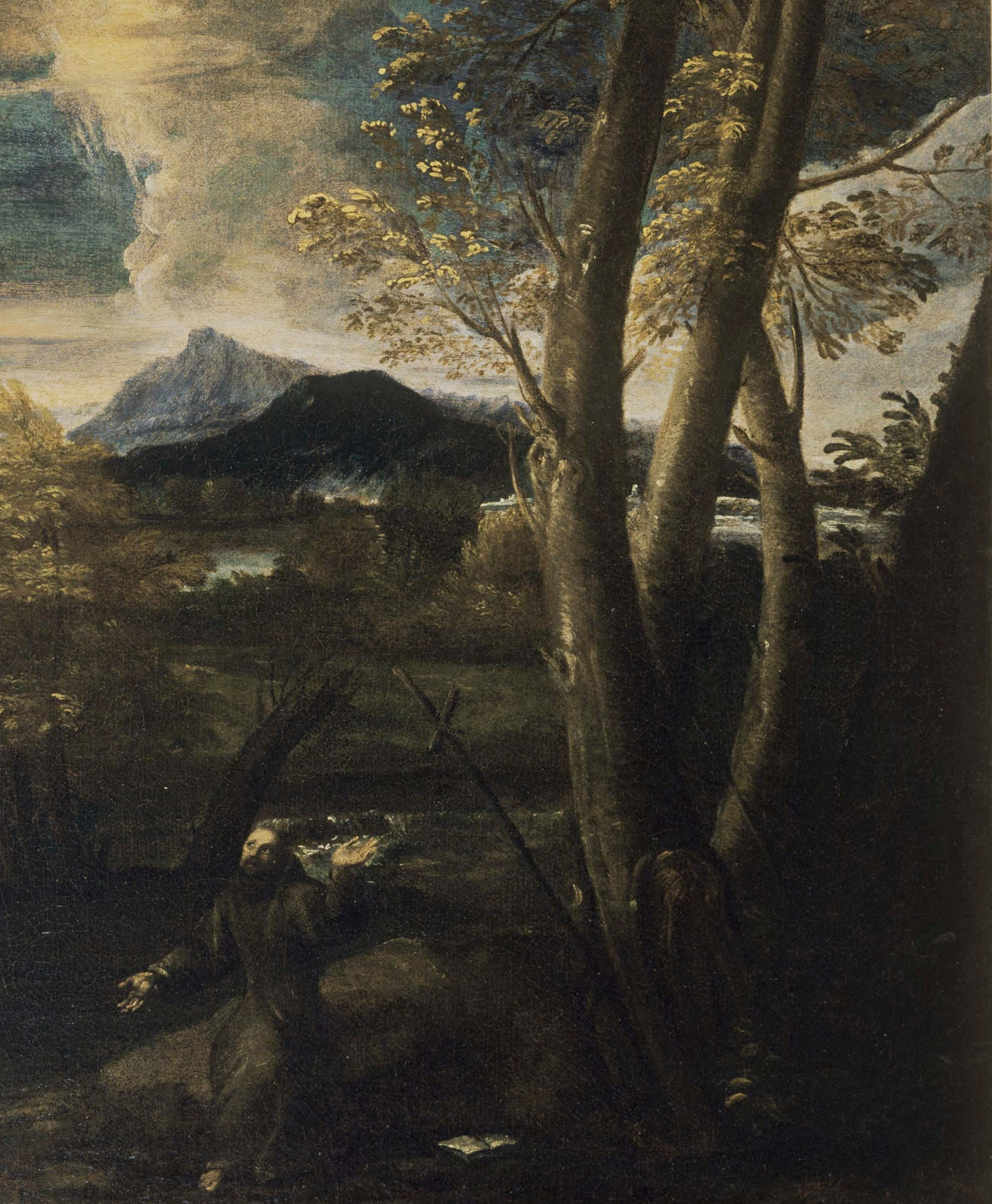
Salvator Rosa – St. Francis in Ecstasy (1644)
“I lost consciousness for a moment or two,” I heard him say. “That’s what saved me. It made me stop thinking about them.”
“You nearly broke my arm in two,” I said, uttering my only connected thought at the moment. A numbness came over me.
“That’s what saved you!” he replied. “Between us, we’ve managed to set them off on a false tack somewhere. The humming has ceased. It’s gone—for the moment at any rate!”
A wave of hysterical laughter seized me again, and this time spread to my friend too—great healing gusts of shaking laughter that brought a tremendous sense of relief in their train. We made our way back to the fire and put the wood on so that it blazed at once. Then we saw that the tent had fallen over and lay in a tangled heap upon the ground.
We picked it up, and during the process tripped more than once and caught our feet in sand.
“It’s those sand-funnels,” exclaimed the Swede, when the tent was up again and the firelight lit up the ground for several yards about us. “And look at the size of them!”
All round the tent and about the fireplace where we had seen the moving shadows there were deep funnel-shaped hollows in the sand, exactly similar to the ones we had already found over the island, only far bigger and deeper, beautifully formed, and wide enough in some instances to admit the whole of my foot and leg.
Neither of us said a word. We both knew that sleep was the safest thing we could do, and to bed we went accordingly without further delay, having first thrown sand on the fire and taken the provision sack and the paddle inside the tent with us. The canoe, too, we propped in such a way at the end of the tent that our feet touched it, and the least motion would disturb and wake us.
In case of emergency, too, we again went to bed in our clothes, ready for a sudden start.
It was my firm intention to lie awake all night and watch, but the exhaustion of nerves and body decreed otherwise, and sleep after a while came over me with a welcome blanket of oblivion. The fact that my companion also slept quickened its approach. At first he fidgeted and constantly sat up, asking me if I “heard this” or “heard that.” He tossed about on his cork mattress, and said the tent was moving and the river had risen over the point of the island, but each time I went out to look I returned with the report that all was well, and finally he grew calmer and lay still. Then at length his breathing became regular and I heard unmistakable sounds of snoring—the first and only time in my life when snoring has been a welcome and calming influence.
This, I remember, was the last thought in my mind before dozing off.
A difficulty in breathing woke me, and I found the blanket over my face. But something else besides the blanket was pressing upon me, and my first thought was that my companion had rolled off his mattress on to my own in his sleep. I called to him and sat up, and at the same moment it came to me that the tent was surrounded. That sound of multitudinous soft pattering was again audible outside, filling the night with horror.
I called again to him, louder than before. He did not answer, but I missed the sound of his snoring, and also noticed that the flap of the tent was down. This was the unpardonable sin. I crawled out in the darkness to hook it back securely, and it was then for the first time I realized positively that the Swede was not here. He had gone.
I dashed out in a mad run, seized by a dreadful agitation, and the moment I was out I plunged into a sort of torrent of humming that surrounded me completely and came out of every quarter of the heavens at once. It was that same familiar humming—gone mad! A swarm of great invisible bees might have been about me in the air. The sound seemed to thicken the very atmosphere, and I felt that my lungs worked with difficulty.
But my friend was in danger, and I could not hesitate.
The dawn was just about to break, and a faint whitish light spread upwards over the clouds from a thin strip of clear horizon. No wind stirred. I could just make out the bushes and river beyond, and the pale sandy patches. In my excitement I ran frantically to and fro about the island, calling him by name, shouting at the top of my voice the first words that came into my head. But the willows smothered my voice, and the humming muffled it, so that the sound only traveled a few feet round me. I plunged among the bushes, tripping headlong, tumbling over roots, and scraping my face as I tore this way and that among the preventing branches.
Then, quite unexpectedly, I came out upon the island’s point and saw a dark figure outlined between the water and the sky. It was the Swede. And already he had one foot in the river! A moment more and he would have taken the plunge.
I threw myself upon him, flinging my arms about his waist and dragging him shorewards with all my strength. Of course he struggled furiously, making a noise all the time just like that cursed humming, and using the most outlandish phrases in his anger about “going inside to Them,” and “taking the way of the water and the wind,” and God only knows what more besides, that I tried in vain to recall afterwards, but which turned me sick with horror and amazement as I listened. But in the end I managed to get him into the comparative safety of the tent, and flung him breathless and cursing upon the mattress where I held him until the fit had passed.
I think the suddenness with which it all went and he grew calm, coinciding as it did with the equally abrupt cessation of the humming and pattering outside—I think this was almost the strangest part of the whole business perhaps. For he had just opened his eyes and turned his tired face up to me so that the dawn threw a pale light upon it through the doorway, and said, for all the world just like a frightened child:
“My life, old man—it’s my life I owe you. But it’s all over now anyhow.
They’ve found a victim in our place!”
Then he dropped back upon his blankets and went to sleep literally under my eyes. He simply collapsed, and began to snore again as healthily as though nothing had happened and he had never tried to offer his own life as a sacrifice by drowning. And when the sunlight woke him three hours later—hours of ceaseless vigil for me—it became so clear to me that he remembered absolutely nothing of what he had attempted to do, that I deemed it wise to hold my peace and ask no dangerous questions.
He woke naturally and easily, as I have said, when the sun was already high in a windless hot sky, and he at once got up and set about the preparation of the fire for breakfast. I followed him anxiously at bathing, but he did not attempt to plunge in, merely dipping his head and making some remark about the extra coldness of the water.
“River’s falling at last,” he said, “and I’m glad of it.”
“The humming has stopped too,” I said.
He looked up at me quietly with his normal expression. Evidently he remembered everything except his own attempt at suicide.
“Everything has stopped,” he said, “because—”
He hesitated. But I knew some reference to that remark he had made just before he fainted was in his mind, and I was determined to know it.
“Because ‘They’ve found another victim’?” I said, forcing a little laugh.
“Exactly,” he answered, “exactly! I feel as positive of it as though—as though—I feel quite safe again, I mean,” he finished.
He began to look curiously about him. The sunlight lay in hot patches on the sand. There was no wind. The willows were motionless. He slowly rose to feet.
“Come,” he said; “I think if we look, we shall find it.”
He started off on a run, and I followed him. He kept to the banks, poking with a stick among the sandy bays and caves and little back-waters, myself always close on his heels.
“Ah!” he exclaimed presently, “ah!”
The tone of his voice somehow brought back to me a vivid sense of the horror of the last twenty-four hours, and I hurried up to join him. He was pointing with his stick at a large black object that lay half in the water and half on the sand. It appeared to be caught by some twisted willow roots so that the river could not sweep it away. A few hours before the spot must have been under water.
“See,” he said quietly, “the victim that made our escape possible!”
And when I peered across his shoulder I saw that his stick rested on the body of a man. He turned it over. It was the corpse of a peasant, and the face was hidden in the sand. Clearly the man had been drowned, but a few hours before, and his body must have been swept down upon our island somewhere about the hour of the dawn—at the very time the fit had passed.
“We must give it a decent burial, you know.”
“I suppose so,” I replied. I shuddered a little in spite of myself, for there was something about the appearance of that poor drowned man that turned me cold.
The Swede glanced up sharply at me, an undecipherable expression on his face, and began clambering down the bank. I followed him more leisurely. The current, I noticed, had torn away much of the clothing from the body, so that the neck and part of the chest lay bare.
Halfway down the bank my companion suddenly stopped and held up his hand in warning; but either my foot slipped, or I had gained too much momentum to bring myself quickly to a halt, for I bumped into him and sent him forward with a sort of leap to save himself. We tumbled together on to the hard sand so that our feet splashed into the water. And, before anything could be done, we had collided a little heavily against the corpse.
The Swede uttered a sharp cry. And I sprang back as if I had been shot.
At the moment we touched the body there rose from its surface the loud sound of humming—the sound of several hummings—which passed with a vast commotion as of winged things in the air about us and disappeared upwards into the sky, growing fainter and fainter till they finally ceased in the distance. It was exactly as though we had disturbed some living yet invisible creatures at work.
My companion clutched me, and I think I clutched him, but before either of us had time properly to recover from the unexpected shock, we saw that a movement of the current was turning the corpse round so that it became released from the grip of the willow roots. A moment later it had turned completely over, the dead face uppermost, staring at the sky. It lay on the edge of the main stream. In another moment it would be swept away.
The Swede started to save it, shouting again something I did not catch about a “proper burial”—and then abruptly dropped upon his knees on the sand and covered his eyes with his hands. I was beside him in an instant.
I saw what he had seen.
For just as the body swung round to the current the face and the exposed chest turned full towards us, and showed plainly how the skin and flesh were indented with small hollows, beautifully formed, and exactly similar in shape and kind to the sand-funnels that we had found all over the island.
“Their mark!” I heard my companion mutter under his breath. “Their awful mark!”
And when I turned my eyes again from his ghastly face to the river, the current had done its work, and the body had been swept away into mid-stream and was already beyond our reach and almost out of sight, turning over and over on the waves like an otter.
Edited & Foreword by: Michael Barnett
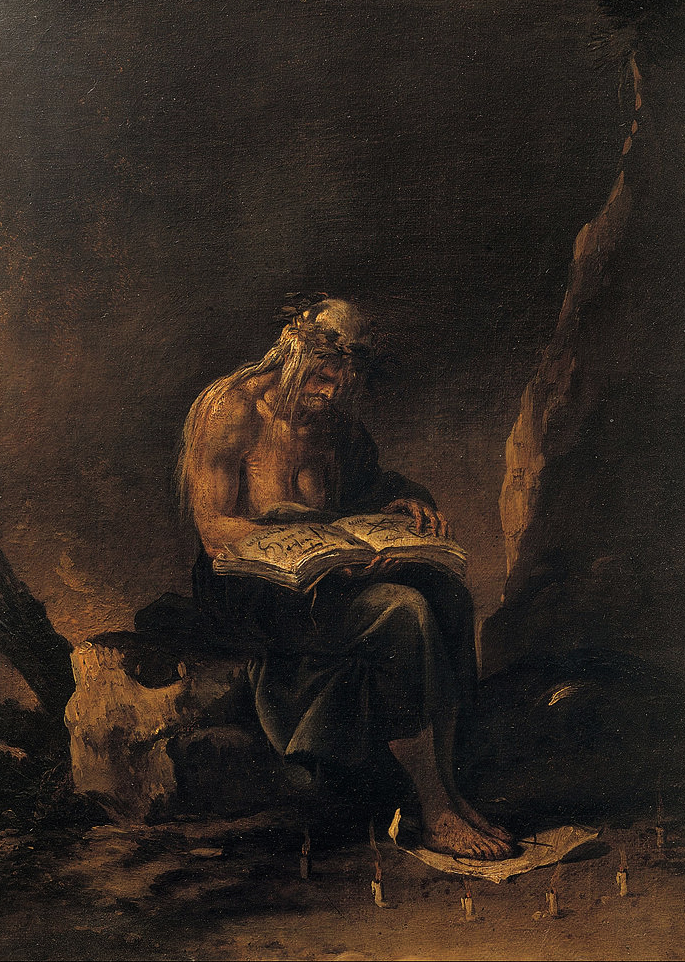
Salvator Rosa – A Witch – 1646
¹ Lovecraft, H.P. Supernatural Horror in Literature. “The Modern Masters.” 1927. http://www.yankeeclassic.com/miskatonic/library/stacks/literature/lovecraft/essays/supernat/supern10.htm
If you enjoyed this novella, keep an eye out for more like this coming soon!
Check out this rare poem which I couldn’t find anywhere online, so published it myself.
‘To Satan’ by Samuel Loveman to H.P. Lovecraft.
Check out the ‘Book Reviews’ & ‘Writers Corner’ sections for more articles related to these topics and formats.
Like this:
Like Loading...
